陶洁《美国文学选读》笔记和课后习题(含考研真题)详解(斯蒂芬 克莱恩)【圣才出品】
陶洁《美国文学选读》(第3版)笔记和课后习题详解(第14单元 弗

第14单元弗•斯科特•菲茨杰拉德14.1复习笔记I.Introduction to author(作者简介)1.Life(生平)F.Scott Fitzgerald(1896-1940)was born into a St.Paul middle-class family.He had education first in private schools and then at Princeton.In1917he left Princeton and enlisted in the army.But he never went to the war.During the period of15months of service in the army,he fell in love with Zelda Sayre,the daughter of a judge.Zelda told Fitzgerald that she would marry him only if he could get up in the world.In1920Fitzgerald’s This Side of Paradise was published and became immensely popular.On the strength of this one successful book,he won the expressive prize of Zelda.The Fitzgeralds were not always happy in their married life.They were also fighting each other all the time.Zelda began to have breakdowns and had to be put in a mental institution.Loneliness,alcohol and the awareness that he was dissipating his talent eventually combined to break him down.In the last year of his life,he began to write one very interesting novel,The Last Tycoon,which he never finished.In1940,he died at the age of44.Fitzgerald was essentially a1920s person.His Tales of the Jazz gave its name to this crucial period in the cultural history of America.He was the spokesman of the Jazz Age.弗·斯科特·菲茨杰拉德(1896—1940)出生于明尼苏达州首府圣保罗的一个中产阶级家庭。
陶洁《美国文学选读》课后习题详解(斯蒂芬 克莱恩)【圣才出品】
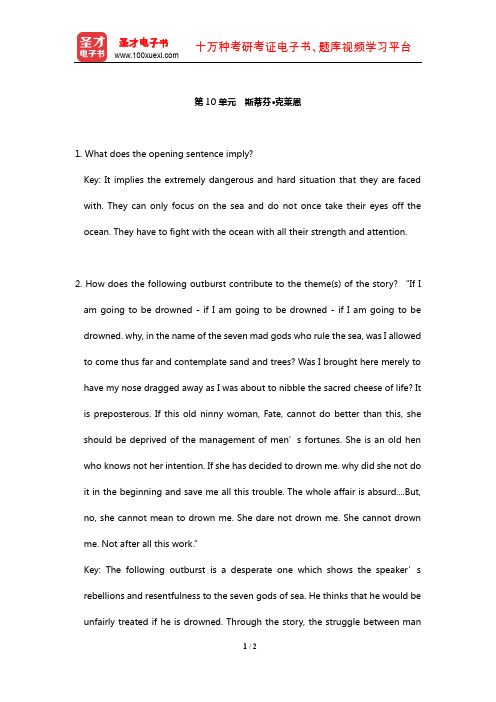
第10单元斯蒂芬•克莱恩1. What does the opening sentence imply?Key: It implies the extremely dangerous and hard situation that they are faced with. They can only focus on the sea and do not once take their eyes off the ocean. They have to fight with the ocean with all their strength and attention.2. How does the following outburst contribute to the theme(s) of the story? “If I am going to be drowned - if I am going to be drowned - if I am going to be drowned. why, in the name of the seven mad gods who rule the sea, was I allowed to come thus far and contemplate sand and trees? Was I brought here merely to have my nose dragged away as I was about to nibble the sacred cheese of life? It is preposterous. If this old ninny woman, Fate, cannot do better than this, she should be deprived of the management of men’s fortunes. She is an old hen who knows not her intention. If she has decided to drown me. why did she not do it in the beginning and save me all this trouble. The whole affair is absurd....But, no, she cannot mean to drown me. She dare not drown me. She cannot drown me. Not after all this work.”Key: The following outburst is a desperate one which shows the speaker’s rebellions and resentfulness to the seven gods of sea. He thinks that he would be unfairly treated if he is drowned. Through the story, the struggle between manand the natural world is the most apparent theme. In fact, the speaker knows that nature is powerful and ruthless, and it will not show sympathy nor punish anyone, so, he thinks that he must survive by his own efforts. He must save himself.3. In what way could the survivors be interpreters?Key: The survivors can be interpreters to interpret the relationships between man and nature. They went through the hard struggles with nature, so they would have a better understanding of nature and man.。
陶洁《美国文学选读》课后习题详解(本杰明 富兰克林)【圣才出品】
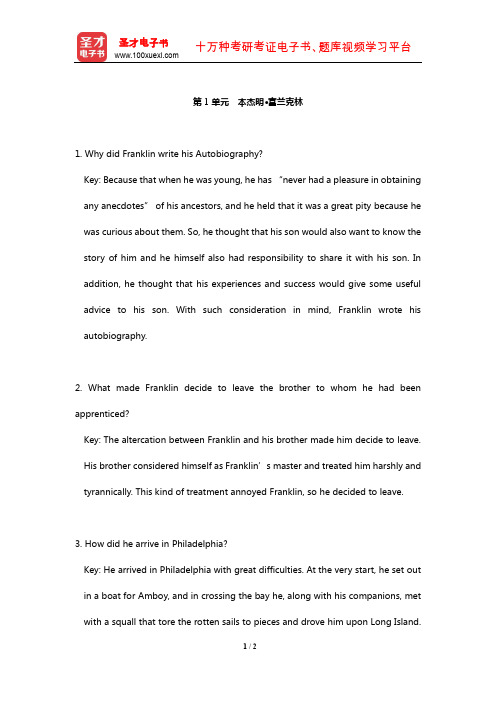
第1单元本杰明•富兰克林1. Why did Franklin write his Autobiography?Key: Because that when he was young, he has “never had a pleasure in obtaining any anecdotes” of his ancestors, and he held that it was a great pity because he was curious about them. So, he thought that his son would also want to know the story of him and he himself also had responsibility to share it with his son. In addition, he thought that his experiences and success would give some useful advice to his son. With such consideration in mind, Franklin wrote his autobiography.2.What made Franklin decide to leave the brother to whom he had been apprenticed?Key: The altercation between Franklin and his brother made him decide to leave. His brother considered himself as Franklin’s master and treated him harshly and tyrannically. This kind of treatment annoyed Franklin, so he decided to leave.3. How did he arrive in Philadelphia?Key: He arrived in Philadelphia with great difficulties. At the very start, he set out in a boat for Amboy, and in crossing the bay he, along with his companions, met with a squall that tore the rotten sails to pieces and drove him upon Long Island.On approaching the island, they had to drop anchor and swim out their cable towards the shore, etc. In a word, he went through many hardships on the way to Philadelphia.4. What features do you find in the style of the above selection?Key: This selection is written in the form of letters to his son. By this way, it can show the author’s honesty and frankness, which will make the reader stand close to him and actually feel and understand his emotions and experiences. Another feature is that this biography has a good narrative and reads like a story, which can arouse the readers’ reading interest and curiosity.。
陶洁《美国文学选读》笔记和课后习题(含考研真题)详解(本杰明 富兰克林)【圣才出品】
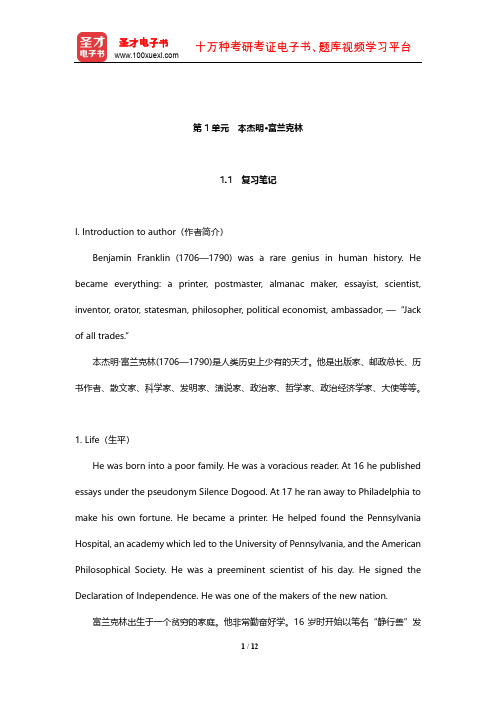
第1单元本杰明•富兰克林1.1 复习笔记I. Introduction to author(作者简介)Benjamin Franklin (1706—1790) was a rare genius in human history. He became everything: a printer, postmaster, almanac maker, essayist, scientist, inventor, orator, statesman, philosopher, political economist, ambassador, —“Jack of all trades.”本杰明·富兰克林(1706—1790)是人类历史上少有的天才。
他是出版家、邮政总长、历书作者、散文家、科学家、发明家、演说家、政治家、哲学家、政治经济学家、大使等等。
1. Life(生平)He was born into a poor family. He was a voracious reader. At 16 he published essays under the pseudonym Silence Dogood. At 17 he ran away to Philadelphia to make his own fortune. He became a printer. He helped found the Pennsylvania Hospital, an academy which led to the University of Pennsylvania, and the American Philosophical Society. He was a preeminent scientist of his day. He signed the Declaration of Independence. He was one of the makers of the new nation.富兰克林出生于一个贫穷的家庭。
陶洁《美国文学选读》(第3版)章节题库-第十章至第十四章【圣才出品】
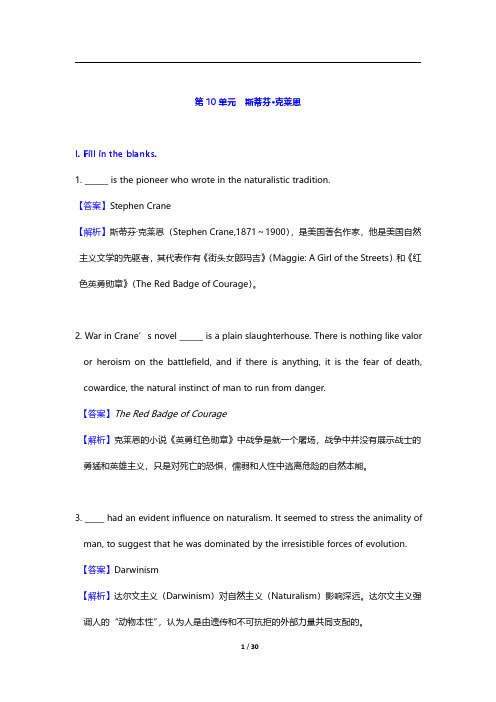
第10单元斯蒂芬·克莱恩I.Fill in the blanks.1.______is the pioneer who wrote in the naturalistic tradition.【答案】Stephen Crane【解析】斯蒂芬·克莱恩(Stephen Crane,1871~1900),是美国著名作家,他是美国自然主义文学的先驱者,其代表作有《街头女郎玛吉》(Maggie:A Girl of the Streets)和《红色英勇勋章》(The Red Badge of Courage)。
2.War in Crane’s novel______is a plain slaughterhouse.There is nothing like valor or heroism on the battlefield,and if there is anything,it is the fear of death, cowardice,the natural instinct of man to run from danger.【答案】The Red Badge of Courage【解析】克莱恩的小说《英勇红色勋章》中战争是就一个屠场,战争中并没有展示战士的勇猛和英雄主义,只是对死亡的恐惧,懦弱和人性中逃离危险的自然本能。
3._____had an evident influence on naturalism.It seemed to stress the animality of man,to suggest that he was dominated by the irresistible forces of evolution.【答案】Darwinism【解析】达尔文主义(Darwinism)对自然主义(Naturalism)影响深远。
达尔文主义强调人的“动物本性”,认为人是由遗传和不可抗拒的外部力量共同支配的。
陶洁《美国文学选读》(第3版)考研真题精选-名词解释及作品分析题【圣才出品】
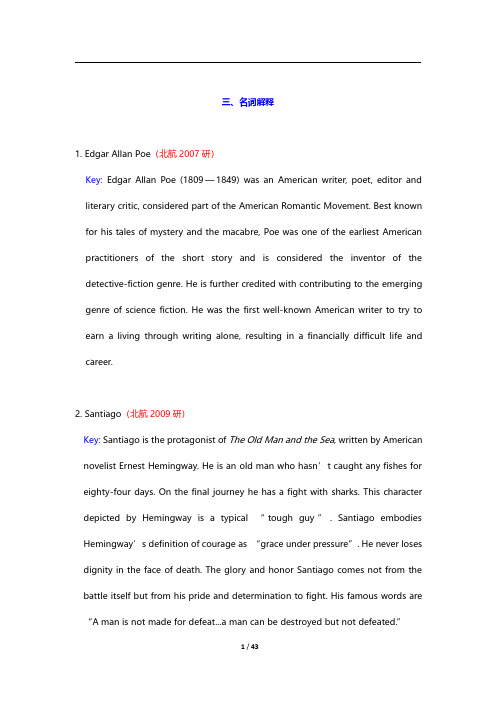
三、名词解释1.Edgar Allan Poe(北航2007研)Key:Edgar Allan Poe(1809—1849)was an American writer,poet,editor and literary critic,considered part of the American Romantic Movement.Best known for his tales of mystery and the macabre,Poe was one of the earliest American practitioners of the short story and is considered the inventor of the detective-fiction genre.He is further credited with contributing to the emerging genre of science fiction.He was the first well-known American writer to try to earn a living through writing alone,resulting in a financially difficult life and career.2.Santiago(北航2009研)Key:Santiago is the protagonist of The Old Man and the Sea,written by American novelist Ernest Hemingway.He is an old man who hasn’t caught any fishes for eighty-four days.On the final journey he has a fight with sharks.This character depicted by Hemingway is a typical“tough guy”.Santiago embodies Hemingway’s definition of courage as“grace under pressure”.He never loses dignity in the face of death.The glory and honor Santiago comes not from the battle itself but from his pride and determination to fight.His famous words are “A man is not made for defeat...a man can be destroyed but not defeated.”3.Walt Whitman and Leaves of Grass(南开大学2010研)Key:Walt Whitman(1819—1892)was a great American poet in the19th century. He added to the literary independence of the new nation and devoted all his life to the creation of the“single”poem,Leaves of Grass.In this giant work, openness,freedom,and above all,individualism are all that concern him. Whitman broke from the traditional iambic pentameter and wrote“free verse”. His long“catalogs”of lines gave free rein to his imagination in his life-long attempt to celebrate life in the new life.4.The Southern Renaissance in American Literature(四川大学2011研;北航2008研)Key:The Southern Renaissance(also known as Southern Renascence)was the reinvigoration of American Southern literature that began in the1920s and1930s with the appearance of writers such as William Faulkner,Tennessee Williams,and Robert Penn Warren and so on.Before the Southern Renaissance,the Southern literature was dominated by writers who supported the“Lost Cause”—the heroism of the Confederate army and civilian population during the Civil War and the supposedly“idyllic culture”that existed in the South before the war.The Southern Renaissance changed this by addressing three major themes in their works.they are1)The burden of history in a place where many people still remembered slavery,Reconstruction,and a devastating military defeat,2)theSouth’s conservative culture,specifically on how an individual could exist without losing a sense of identity in a region where family,religion,and community were more highly valued than one’s personal and social life,3)the South’s troubled history in regards to racial issues.They also brought new modernistic techniques such as stream of consciousness and complex narrative techniques to their works(as Faulkner did in his novel As I Lay Dying).5.Transcendentalism(南开大学2008研,北二外2010研;北航2010研)Key:Transcendentalism is a New England movement,which flourished from about1835to1860.It had its roots in romanticism and in post-Kantian idealism by which Coleridge was influenced.It had a considerable influence on American art and literature.Basically religious,it emphasized the role and importance of the individual conscience,and the value of intuition in matters of moral guidance and inspiration.The actual term was coined by opponents of the movement,but accepted by its members.The group of people was also social reformers.Some of the members,besides Emerson,were famous,including Bronson Alcott,Henry David Thoreau and Nathaniel Hawthorne.6.Henry James(四川大学2009研)Key:Henry James(1843-1916)is a famous American writer and one of the key figures of19th century literary realism.In his novels,he usually describes the upper class of the American society.He is also famous for psychological realism.His major works include:The Portrait of a Lady,The Ambassadors,Daisy Miller etc.7.Imagism(北外2009研;南开大学2009研;北京邮电大学2010研)Key:Imagism is a literary movement which came into being in Britain and U.S. around1910as a reaction to the traditional English poetry to express the sense of fragmentation and dislocation.The imagists,with Ezra Pound leading the way, hold that the most effective means to express these momentary impressions is through the use of one dominant image.Imagism is characterized by the following three poetic principles:i)direct treatment of subject matter;ii) economy of expression;iii)as regards rhythm,to compose in the sequence of the musical phrase,not in the sequence of metronome.Ezra Pound’s“In a Station of the Metro”is a well-known imagist poem.8.Black humor(厦门大学2010研)Key:It is a kind of writing that places grotesque elements side by side with humorous ones in an attempt to shock the readers,forcing him or her to laugh at the horrifying reality of a disordered world.It is a humor out of despair and laughter out of tears.Black humor conveys anguish and fury at conditions in which institutionalized absurdity gets the upper hand.It intends to satirize hypocrisy,racial prejudice,and above all the dehumanization of the individual by a modern society.Black humor prevails in modern American Literature.JosephHeller’s Novel Cater-22is considered a superb example of the use of Black humor.Kurt Vonnegut’s Slaughterhouse Five is also a case in point.9.Avant-Garde(上海交大2007研)Key:Avant-garde,the French military and political term for the vanguard of an army or political movement,extended since the late19th century to avant-garde that body of artists and writers who are dedicated to the idea of art as experiment and revolt against tradition.Ezra Pound’s view that‘Artists are the antennae of the race,is a distinctly modern one,implying a duty to stay ahead of one’s time through constant innovation in forms and subjects.10.Ezra Pound and The Cantos(南开大学2009研)Key:Ezra Weston Loomis Pound(1885–1972)was an American expatriate poet, critic and intellectual who was a major figure of the Modernist movement in the first half of the20th century.His significant contributions to poetry begin with his promotion of Imagism.The Cantos by Ezra Pound is a long,incomplete poem in120sections,each of which is a canto.Most of it was written between1915and1962,although much of the early work was abandoned and the early cantos,as finally published, date from1922onwards.Strong claims have been made for it as the most significant work of modernist poetry of the twentieth century.The most striking feature of the text,to a casual browser,is the inclusion of Chinese characters aswell as quotations in European languages other than English.11.“Self-reliance”(北二外2009研)Key:“Self-Reliance”is an essay written by American Transcendentalist philosopher and essayist,Ralph Waldo Emerson.It contains the most solid statement of one of Emerson’s repeating themes,the need for each individual to avoid conformity and false consistency,and follow his or her own instincts and ideas.Emerson’s ideas are considered a reaction to a commercial identity;he calls for a return to individual identity.12.First-person narrative(上海交大2003研)Key:First-person narrative is also called first person point of view,which is used in the analysis and criticism of fiction to describe the way in which the writer presents the reader with the materials of the story.The first person point of view relates events as they are perceived by a single character,“I”.The narrator“I”may be part of the action or an observer,a major or minor participant in the action.As readers,we cannot know or witness anything the narrator does not tell us.We therefore share all the limitations of the narrator.This technique has the advantage of a sharp and precise focus.Moreover,you feel part of the story because the narrator’s“I”echoes the“I”already in your own mind”.Mark Twain’s novel Adventures of Huckleberry Finn is presented from the first person viewpoint.四、作品分析题Passage1(人大2007研)“Prophet!”said I,“thing of evil!—prophet still,if bird or devil!—Whether tempter sent,or whether tempest tossed thee here ashore,Desolate yet all undaunted,on this desert land enchanted—On this home by horror haunted—tell me truly,I implore—Is there—is there balm in Gilead?—tell me—tell me,I implore!”Questions:1.Give the title of the work and the full name of the author.2.Explain the implications of the underlined parts.Key:1.“The Raven”by Edgar Allan Poe2.Prophet:The speaker here calls the raven as a prophet,who can give him someclues to his puzzle of his beloved one.Implore:This word means that the speaker appeals the raven to tell him whether there are ways to cure his pain.Balm in Gilead:This sentence is quoted from the Bible,which means that whether there are some medicines to reduce the speaker’s pain.Passage2(北二外2009研)The following poem is written for the mourning of the Assassination of President Abraham Lincoln.Read it and answer the questions.O Captain!My CaptainO Captain!My Captain!Our fearful trip is done,The ship has weather’d every rack,the prize we sought is won,The port is near,the bells I hear,the people all exulting,While follow eyes the steady keel,the vessel grim and daring;But O heart!heart!heart!O the bleeding drops of red!Where on the deck my Captain lies,Fallen cold and dead.O Captain!My Captain!Rise up and hear the bells;Rise up—for you the flag is flung—for you the bugle trills,For you bouquets and ribbon’d wreaths—for you the shores crowding,For you they call,the swaying mass,their eager faces turning;Here,Captain!Dear father!This arm beneath your head;It is some dream that on the deckYou’ve fallen cold and dead.My Captain does not answer,his lips are pale and still,My father does not feel my arm,he has no pulse nor will;The ship is anchor’d safe and sound,its voyage closed and done;From fearful trip the victor ship comes in with object won;Exult,O shores!And ring,O bells!But I,with mournful tread,Walk the deck my captain lies,Fallen cold and dead.1.The writer of this famous poem is one of the most influential poets at the age of romanticism.Can you give out his name and present his contribution in literature briefly?2.Can you enlist at least two major figures of speech used in this poem and illustrate their functions respectively?Key:1.The author of this poem is Walt Whitman.Whitman’s influence over modern poetry is great in America as well as in the world.His best works have been part of the common property of Western culture.Many poets in England,France,Italy and Latin America are in his debt.Modern American poets like T.S.Eliot and Ezra Pound would not have been what they were without Whitman.Contemporary American poetry,whatever school or form,bears witness to his great influence. For his innovations in diction and versification,his frankness about sex,his inclusion of the commonplace and the ugly and his censure of the weaknesses of the American democratic practice—these have paved his way for a share of。
陶洁《美国文学选读》(第3版)笔记和课后习题详解(第8单元 马克

第8单元马克•吐温8.1复习笔记I.Introduction to author(作者简介)1.Life(生平)Mark Twain(1835-1910)is the pen name of Samuel Langhorne Clemens.He was an American novelist and humorist.Twain grew up in Missouri,which would later provide the setting for Huckleberry Finn and Tom Sawyer.He apprenticed with a printer.He also worked as a typesetter and contributed articles to his older brother Orion’s newspaper.After toiling as a printer in various cities,he became a master riverboat pilot on the Mississippi River before heading west to join Orion.He was a failure at gold mining, so he next turned to journalism.While a reporter,he wrote a humorous story,"The Celebrated Jumping Frog of Calaveras County,"which became very popular and brought nationwide attention.His travelogues were also well received.He achieved great success as a writer and public speaker.His wit and satire earned praise from critics and peers,and he was a friend to presidents,artists, industrialists,and European royalty.马克·吐温(1835—1910)是萨缪尔·朗赫恩·克莱门斯的笔名。
陶洁《美国文学选读》(第2版)笔记和课后习题详解-第1~13单元【圣才出品】
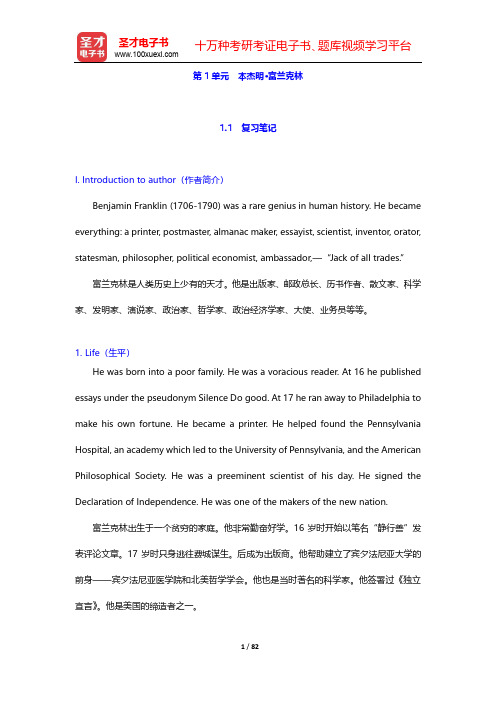
第1单元本杰明•富兰克林1.1 复习笔记I. Introduction to author(作者简介)Benjamin Franklin (1706-1790) was a rare genius in human history. He became everything: a printer, postmaster, almanac maker, essayist, scientist, inventor, orator, statesman, philosopher, political economist, ambassador,—“Jack of all trades.”富兰克林是人类历史上少有的天才。
他是出版家、邮政总长、历书作者、散文家、科学家、发明家、演说家、政治家、哲学家、政治经济学家、大使、业务员等等。
1. Life(生平)He was born into a poor family. He was a voracious reader. At 16 he published essays under the pseudonym Silence Do good. At 17 he ran away to Philadelphia to make his own fortune. He became a printer. He helped found the Pennsylvania Hospital, an academy which led to the University of Pennsylvania, and the American Philosophical Society. He was a preeminent scientist of his day. He signed the Declaration of Independence. He was one of the makers of the new nation.富兰克林出生于一个贫穷的家庭。
(完整word版)美国文学选读 第三版 课后习题答案 陶洁
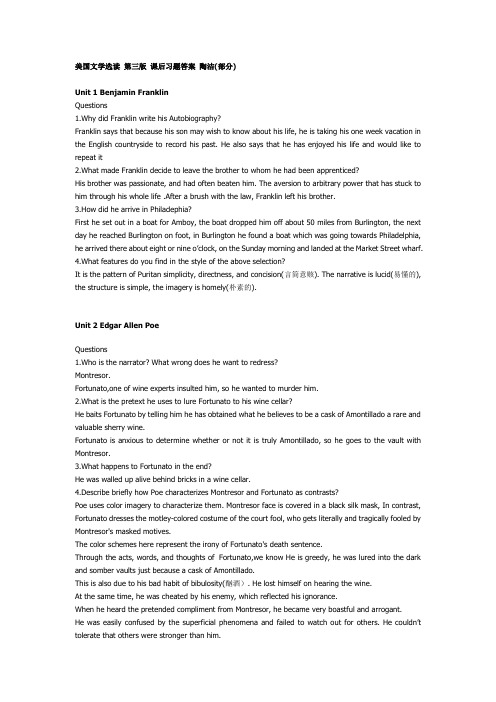
美国文学选读第三版课后习题答案陶洁(部分)Unit 1 Benjamin FranklinQuestions1.Why did Franklin write his Autobiography?Franklin says that because his son may wish to know about his life, he is taking his one week vacation in the English countryside to record his past. He also says that he has enjoyed his life and would like to repeat it2.What made Franklin decide to leave the brother to whom he had been apprenticed?His brother was passionate, and had often beaten him. The aversion to arbitrary power that has stuck to him through his whole life .After a brush with the law, Franklin left his brother.3.How did he arrive in Philadephia?First he set out in a boat for Amboy, the boat dropped him off about 50 miles from Burlington, the next day he reached Burlington on foot, in Burlington he found a boat which was going towards Philadelphia, he arrived there about eight or nine o’clock, on the Sunday morning and landed at the Market Street wharf.4.What features do you find in the style of the above selection?It is the pattern of Puritan simplicity, directness, and concision(言简意赅). The narrative is lucid(易懂的), the structure is simple, the imagery is homely(朴素的).Unit 2 Edgar Allen PoeQuestions1.Who is the narrator? What wrong does he want to redress?Montresor.Fortunato,one of wine experts insulted him, so he wanted to murder him.2.What is the pretext he uses to lure Fortunato to his wine cellar?He baits Fortunato by telling him he has obtained what he believes to be a cask of Amontillado a rare and valuable sherry wine.Fortunato is anxious to determine whether or not it is truly Amontillado, so he goes to the vault with Montresor.3.What happens to Fortunato in the end?He was walled up alive behind bricks in a wine cellar.4.Describe briefly how Poe characterizes Montresor and Fortunato as contrasts?Poe uses color imagery to characterize them. Montresor face is covered in a black silk mask, In contrast, Fortunato dresses the motley-colored costume of the court fool, who gets literally and tragically fooled by Montresor's masked motives.The color schemes here represent the irony of Fortunato's death sentence.Through the acts, words, and thoughts of Fortunato,we know He is greedy, he was lured into the dark and somber vaults just because a cask of Amontillado.This is also due to his bad habit of bibulosity(酗酒). He lost himself on hearing the wine.At the same time, he was cheated by his enemy, which reflected his ignorance.When he heard the pretended compliment from Montresor, he became very boastful and arrogant.He was easily confused by the superficial phenomena and failed to watch out for others. He couldn’t tolerate that others were stronger than him.For example, Montresor always stimulated him with Luchresi who was good at connoisseur(鉴赏)in wine. Under the impulse of vanity, he fell into Montreso r’s terrible trap.In fact, he was careless and foolish and didn’t find that the danger was approaching him.He looked down upon Montresor and others.He didn’t realize his foolishness until the death was coming.Talking from the appearance, Monstresor was a well-educated and “kind” businessman.He enjoyed the honor and respect in the city. But in fact, he was an evil and awful person.His inner feelings were so cruel that they even made people tremble.Under his rich appearance was the dirty soul and despicable character.We couldn’t see any glorious virtues in his mind. Instead, his heart was cold and dark.It was the revenge that threw Montresor into the deep evil valley.unit 4 Nathaniel HawthorneQuestions :1.Why is the prison the setting of Chapter 1 ?No matter how optimistic the founders of new colonies may be, they are quick to establish a prison and a cemetery in their “Utopia,” for they know that misbehavior, evil, and death are unavoidable.This belief fits into the larger Puritan doctrine, which puts heavy emphasis on the idea of original sin—the notion that all people are born sinners because of the initial transgressions of Adam and Eve in the Garden of Eden. he is therefore using the prison building to represent the crime and the punishment which are aspect of civilized lifeWhat is the implication of the description of the roses?The rosebush symbolizes the ability of nature to endure and outlast man's activities.The narrator suggests that roses offer a reminder of Nature's kindness to the condemned; for his tale, he says, it will provide either a “sweet moral blossom” or else some relief in the face of unrelenting sorrow and gloom.2.Describe the appearance of Hester Prynne and the attitude of the people towards her.The second paragraph on page 30.The crowd in front of the jail is a mixture of men and women, all maintaining severe looks of disapproval. Several of the women begin to discuss Hester Prynne, and they soon vow that Hester would not have received such a light sentence for her crime if they had been the judges.One woman, the ugliest of the group, goes so far as to advocate death for Hester.3.What has happened to Hester?As a young woman, Hester married an elderly scholar, Chillingworth, who sent her ahead to America to live.While waiting for him, she had an affair with a Puritan minister named Dimmesdale, after which she gave birth to Pearl.The scarlet letter is her punishment for her sin and her secrecy.Why does she make the embroidery of the letter A so elaborate?It seems to declare that she is proud, rather than ashamed, of her sin.In reality, however, Hester simply accepts the “sin” and its symbol as part of herself, just as she accepts her child.And although she can hardly believe her present “realities,” she takes them as they are rather thanresisting them or trying to atone for them.How does this tell us about her character?Throughout The Scarlet Letter Hester is portrayed as an intelligent, capable. It is the extraordinary circumstances shaping her that make her such an important figure.Unit5 Herman MelvilleQuestions1.What are the stories Ismael tells about Moby Dick?Ishmael compares the legend of Moby Dick to his experience of the whale.He notes that sperm whale attacks have increased recently and that superstitious sailors have come to regard these attacks as having an intelligent, even supernatural origin.In particular, wild rumors about Moby Dick circulate among whalemen, suggesting that he can be in more than one place at the same time and that he is immortal. Ishmael remarks that even the wildest of rumors usually contains some truth.Whales, for instance, have been known to travel with remarkable speed from the Atlantic to the Pacific; thus, it is possible for a whale to be caught in the Pacific with the harpoons of a Greenland ship in it. Moby Dick, who has defied capture numerous times, exhibits an “intelligent malignity”(狠毒)in his attacks on men2.Why does Ahab react so violently against the white whale?First, he lost one of his legs because of the white whale.Second,He considers Moby Dick the embodiment of evil in the world, and he pursues the White Whale,because he believes it his inescapable fate to destroy this evil.Ishmael suggests that Ahab is “crazy”and call him “a raving lunatic.” Do you agree with him? Why or why not?Ishmael describes Ahab as mad in his narration, and it does indeed seem mad to try to fight the forces of nature or God.3.What narrative features can you find in the selected chapter?In the selected charpter, Melville employed the technique of multiple view of his narrative to portray Moby Dick to achieve the effect of ambiguity and let readers judge the meaning.Unit 6 Henry David ThoreauQuestions1.Where indeed did Thoreau live, both at a physical level and at a spiritual level?He lived in a cabin on Walden Pond, which belonged to Emerson’s property.2.Had Thoreau ever bought a farm? Why did he enjoy the act of buying?No, he hadn’t.He avoided purchasing a farm because it would inevitably tie him down financially and complicate his life. Thoreau didn’t see the acquisition of wealth as the goal for human existence, he saw the goal of lif e to bean exploration of the mind and of the magnificent world around us.He regarded the places as an existence free of obligations and full of leisure.3.Is it significant that Thoreau mentioned the Fourth of July as the day on which he began to stay in the woods? Why?Yes, it is.Because The Fourth of July is known as Independence Day,the birthday ot the United States.Here Thoreau uses the day to express his beginning of regeneration at Walden.It also means a symbol of his conquest of being.4.How could you answer the question Thoreau asked at the end of this selection?Unit 7 19th Century American Poets1. Henry Wadsworth Longfellow(1) I Shot an Arrow…1. Why did the speaker lose sight of his arrow and song?The arrow flies too swiftly and too far away to be seen by the speaker; whereas the song is naturally invisible.2. In what circumstances did he find them again?He finds them unexpectedly years later from the trunk of a tree and the heart of a friend.3. What do arrow and song stand for in this poem?The images of arrow and song here may stand for friendship.(2) A Psalm of Life1. What kind of person is the speaker of this poem?The speaker is a man of action, always optimistic and cheerful, trying to achieve as much as possible in the short span of life.2. According to the poem, how should our lives be led to overcome the fact that each day brings us nearer to death?We should work harder and live happier.3. Interpret the metaphor of "Footprints on the sand of time" (line 28).The metaphor refers to human deeds in real life.2. Walt Whitman(1)One's Self I Sing1. What is the significance of singing about one's self?It is an exaltation of the individual spirit, which is typical of American people.2. What is the difference between physiology and physiognomy?Physiology is a science that deals with the functions and life process of human beings, whereas physiognomy refers to an art of judging character from contours of face itself or the appearance of a person.3. What does Whitman mean by the term of "the Modern Man"?He means that a man should be free from any prejudice and pride, totally different from the traditional one, that is full of bias.(3) O Captain! My Captain!1. Why is the word "Captain" capitalized throughout the poem?In this poem the word “Captain” specially refers to Abraham Lincoln, president of the United States. 2. What overall metaphor does the poet employ in this poem?Life is a journey.3. Why do people on the shores exult and bells ring, while the speaker remains so sad?They welcome the ship returning from its hard trip, whereas the speaker is sad because the captain fails to receive his own honor.3.Emily Dickinson(1) To Make a Prairie …1. What things are needed to "make" a prairie? In what sense can one really do it?Some grass and insects and small animals. People can make a prairie with their imagination.2. How can "revery alone" create a prairie?The prairie stays in one's mind.(2) Success Is Counted Sweetest1. Why is success "counted sweetest by those who ne'er succeed"?Those who have tasted the bitterness of failure would have a keener desire for success.2. Who are "the purple host"?The so-called successful people in the world.3. Who is "he" in the last stanza?Anyone who is pursuing his success.(3) I'm Nobody!1. Who are the "pair of us" and "they" in this poem? The "pair of us" refers to the speaker in the poem and the reader, and "they" refers to the public, especially those in power.2. What does "an admiring bog" really mean?" (line 28).It Implies the vain and empty common people, who are always admiring and pursuing the celebrities.3. What is the theme of this poem?The real admirable life is a secluded and common one.4. Do you want to be "nobody" or "somebody"? Explain your reasons.Different persons would have different answers to this question. Personally, I prefer to be nobody. Unit 8 Mark TwainQuestions1: Why do you think Mr.Wheeler is so eager to tell these stories?From Mr.Wheeler’s behaviors and contents of his narration we can know he is so eager to tell these stories.First, when "I" asked him to tell "me" something about W.Smiley, he “ backed me into a corner and blockaded me with his chair, and then s at down and reeled off the narrative”. And during the process of telling his stories, he never paid any attention to others'response to his story and just went on telling what amused him. At last when the listener felt boring and wanted to leave, Mr.Wheeler even didn't notice it and still asked him to sit there listening to him.Question2: Does his audience share his enthusiasm in telling the stories? No. the audience does not show any interest in Mr.Wheeler’ stories. In fact, the narrator was very feveris h about his stories, but ,in the eyes of the listener,the stories were very boring and had nothing to do with his preoccupation. As an educated man, the listener couldn't understand the way of laborers for joy, and he would never bother himself to understa nd it. So after the long time of Mr.Wheeler’ solo narration and when the audience got a chance, he fled away.Question3: Do you think the narrator and his listener ever suspect the presence of humor? Why? How do you interpret their interactions? The narrator and his listener never noticed or suspected the presence of humor.During the intercourse,the narrator went vigorously on his monotonous narrative "wihout a little smiling" talking about the animals and the things like ,while the listener felt rather puzzled or bothered by his stories.It seemed to be kind of coarse things. So the two different scenes go on separately without a intersection.And their interaction was a complete failure according toour common sense about communication.But it in this sense produced the effect of humor which can be tasted by our readers due to the skills adopted by Mark Twain .Unit 14 F·Scott Fitzgerald1.Do you think Gatsby deserves to be called “the great”? Why?(1)I think it is too complicated to simply say Gatsby deserves to be ―great‖or not.For one thing, Gatsby was ambitious, hardworking, generous and passionate. He was so extremely loyal to his love and Daisy that he could do anything to get Daisy back: he did shady business to earn money and social position; he threw luxurious parties just to draw Daisy’s attention; he could take the blame for a death that he did not cause.(2)In this respect, he is much ―greater‖than his contemporaries. For another thing, Gatsby never realized that Daisy wasn’t the girl he loved anymore. Gatsby was so innocent that he staked everything on his dreams, not realizing that his dreams are unworthy of him. He wasn’t sober enough to be great.2.Does “the green light”Gatsby believed in exist in reality? Why or why not ?(1)I think ―the green light‖does not exist in reality. Because the green light which situated at the end of Daisy’s East Egg dock and barely vis ible from West Egg lawn represents Gatsby’s unattainable dream. Although the color itself can be seen as hope a nd bright future, Gatsby’s quest for Daisy back is doomed to be impossible. Daisy lived in ―a material world without being real, where poor ghost s, breathing dream like air‖.(2)After five years when Gatsby met Daisy again, the miracle Daisy had lost her original glory. Therefore, there is no delaying that Gatsby’s dream would not come true. In the novel, the green light not only represents that innocent Gatsby looked forward to the future, but also means his longing for the history –his happy past with Daisy. The distinction between ideal and reality was huge. As if American dream between golden past and golden future always suffered from the realistic betrayal and crush.3.What does Gatsby’s Schedule reveal about him and how does it relate to the American Dream?(1)The schedule is a reflection of Gatsby’s determination and ambition. It reveals that he is hard on himself in pursuit of his goal—to be an upper-class man.(2)On one hand, we can know that he is persistent in pursuing his American Dream-- to attain wealth and happiness through his struggle. On the other hand, he is too idealistic and naive.(3)He tries his best to make money and learns everything required to be an upper-class man so that he can get access to his beloved girl.Money is important,but there are other barriers difficult to penetrate. The girl he loves is as vulgar and superficial as others in her circle, she is unable to meets Gatsby’s romantic fantasy. So his dream is destined to shatter, which indicates the disillusion of American Dream.4.When you read the line “He (the man with owl-eyed glasses) took off his glasses and wiped them again, outside and in ,” what images does it create in your mind, given the novel’s numerous references to the strikingly strange scene of the spectacled eyes?(1)From this line , superficially, owl-eyes is a person with thick and blurry glasses who can not see clearly all the things in the world. However, we know he is actually an owl-wise observer and sees more clearly than anyone else in the novel. Owl-Eyes, except Nick, is the only friend to appear at the rain-soaked burial of Gatsby, when others are unwilling to come. He feels sympathy for Gatsby’s tragedy.(2)After reading this line, I cannot help thinking of the Dr.Eckleburg billboard with its huge yellow spectacles in this novel. In many rainy days, Dr. Eckleburg’s eyes are also dimmed and seem blind. But in fact this is a pair of "all-seeing" eyes. The Owl-Eyed Man is similar to Dr. Eckleburg, sadly looking at the people’s life and idealism of this time. B oth of them symbolize an uninvolved spectator god. They watch all the activities of the humans. Owl-eyes is the avatar of the sightless Dr. Eckleburg.Unit 16 Ernest Hemingway1. How do you interpret the irony of the title after reading the story?(1)The title ―A Clean Well-Lighted Place‖refers to the caféin the text. The caféwas very clean and well- lighted. From the literary meaning, we may feel this place was very warm and comfortable, was a place where people need warmth wanted to go. So the old man, who was rich but deaf and lonely came here to find warmth and avoided nada. It was the only place he could go and could find some comfort.(2)However, the younger waiter was very selfish. As his wife was waiting him on the bed, he wanted to go home early. Therefore, he refused to offer the old man another cup of wine by the excuse that the business was finished. In fact, there was still an hour from closing time. The younger thought an hour was more important to him than to the old man. The old man needed to leave the only place where he could get far away from nada/ nothing. This café should be warm but the younger waiter forced the lonely and deaf to leave without any sympathy. This is the irony of the title.2. Do you think youth and confidence can help one withstand the metaphorical dark?Why or why not? (1)I don’t think so.In our opinion, the metaphorical dark means nada,nothing in one’s inner heart. In the article, the younger waiter had both youth and confidence; however, he never made full use of them. As we can see, he didn’t understand the old man’s suicide and excessive drinking, and failed to see his tomorrow through the old man’s present situation.(2)What’s more, he had no idea that youth is not permanent, which cannot guarantee love and work. From above, there is no denying that he didn’t realize his nada. Therefore, his youth and confidence never contributed to withstanding his metaphorical dark.(3)I think that, nowadays, youth and confidence do can help to withstand the metaphorical dark, for one can bravely face the reality and overcome the nada with youth and confidence. But they only serve as two main factors. In fact, we need some other factors such as courage, dignity and so on if we want to withstand the metaphorical dark successfully.3.The older waiter said to the younger waiter:“We are of two different kinds.”In what way do you think they are different?(1)I think they are different from each other in the following four aspects:In the beginning, they are in different ages.The older waiter was in his middle age; while the other was much younger.(2)Then, they have different attitudes towards the old man. From the article, we know the older waiter had suffered a lot. He had maintained a clean and well-lighted place in his heart, and he could understand the old man and show sympathy to him. However, the young man was very selfish. He wanted to go home early so that he finished the business one hour earlier and forced the old man to leave. He showed hatred rather than sympathy to the old man.(3)Next, they have different attitudes towards life. The older waiter had a deep sense of life. He was brave and wanted to fight again nada. Besides, he cared about others. The younger one was totally different; he has a shadow understanding of life. He satisfied with his present love and work, he only care about himself and was reluctant to take others into consideration. He even never thought of his future.(4)Finally, they have different attitudes towards nada. The older waiter had realized that it is impossible to avoid nada in one’s whole life. The only thing he can do is to keep a kind of clearness in his own mind. So he was willing to work late for the lonely old man and was pleased to help those who are suffering nada. But out of youth and confidence, he failed to overcome nada. On the contrary, the younger waiter had the two most important factors for withstanding nada; however, he didn’t realize the nada in his heart at all. Then his youth and confidence became useless.Unit 17 20th -Century American Poets1. Ezra Pound In A Station of the Metro1. Why does the poet call the faces of pedestrians "apparition"?These pedestrians are all walking in a hurry amidst the drizzling rain.2. What do "petals" and "bough" stand for? Petals refer to the faces while the bough stands for the floating crowd.2. Wallace Stevens Anecdote of the Jar1. What does the jar in poem symbolize? Why does the speaker place it on top of a hill? The jar here symbolizes a certain perspective on looking at this world. If the perspective of the viewing is creative and unique, it will change the conventional order of the old world. When a new perspective comes out, it will certainly hold attention from the rest.2. The jar is "round" and "of a port in air," meaning that it has a stately importance. What effect does it have on surroundings when placed on the ground? Maybe the round jar assumes the air of a domineering figure, which helps to form a certain order out of the disordered surrounding.3. How did the wilderness of Tennessee characterized? What words or phrases does the poet use to describe it? Tennessee seems to a place full of life and energy. “Slovenly,” “sprawl” and “wild” are some of the words used to describe the place. (See Anecdote of the Jar )4.Robert Frost(1)Fire and Ice1. What are the symbolic meanings of fire in this poem? Fire symbolizes natural disaster, human passion, as well as war.2. Why does the speaker say that ice is also great for destruction? Explain what ice stands for here. Ice, oppose to fire, is also a dreadful natural disaster in this world, and ice is always related to indifference, coldness, hatred, and the other negative sentiments of human beings.3. What is your opinion about fire and ice? Which one is more destructive? Both fire and ice can destroy this beautiful world if they are beyond control of human beings. Therefore we should be open-minded and reduce our prejudice and pride so as to keep this world in peace.(2)Stopping By Woods On a Snowy Evening1. In your opinion, what was the reason that made the speaker stop by the woods on a snowy evening? The poet was deeply attracted by the natural beauty of the scene at that very moment.2. Why did the horse give the harness bell a shake? The horse grew impatient by stopping in the middle of the dark, cold woods at midnight. It was eager to go home.3. Why couldn't the speaker stay longer by the woods to appreciate its mysterious beauty? He realized that it was late at night and he would have to hurry home to get some food and sleep, because the next morning he would have a lot of work to do.4. What is the effect of repetition in the last two lines? The refrain-like repetition in the last two lines reminds the reader a simple fact of life: whatever happens, one must go forward in the journey of his or her life.(3) The Road Not Taken1. What is the speaker's initial response to the divergence of the two roads? The speaker is at a loss which road he should choose, and he feels sorry that he cannot explore both roads at the same time.2. Describe the similarities and differences of these two roads. Which one does the speaker take? Two roads are similar except one of them is more “grassy,” which implies that it is less traveled by pe ople. The speaker prefers the less traveled one, because he likes adventure.3. What might the two roads stand for in the speaker's mind? One road stands for the traditional one and the other is unconventional one and full of challenges and difficulties. To follow other people's footsteps or to open a new road for himself is really not an easy decision for us to make in our lives.Unit22 Allen GinsbergAll through the poem, the speaker is addressing to Walt Whitman. Is this poem about Walt Whitman or about modern America?-----from Allen Ginsberg A Supermarket in CaliforniaThe author in this poem wanted to emphasis his theme about showing his respect to the passed age and showing his worry about the corrupt in the part of spirit and society. As we all know, Walt Whitman’s poetry was a revolution in American literature can be seen in the first publication of Leaves of Grass in 1855. His poetry is “free verse” in that the lack of meter and rhyme is known as his major technical innovation. Allen Ginsberg had a highly praise on him. As the movement of Beat Generation, Allen Ginsberg used poetry as weapon to express his own understanding of Beat---beatific and beat down.In this poem, the author wrote the sentence “shopping for images”. What he wanted t o buy is the things which were listed by Walt Whitman many years ago. What is in the supermarket? The fresh fruits on the shelf fit the needs of customers and the families. We across a strange statement: shopping for images. How can we shop for images? What he refers to us is still the pure image---“dreaming of your enumerations”. The things on the shelf are the images of languages in Walt Whitman’s poetry. The language in Walt Whitman’s poetry and the spirit in his poetry are the things which Allen Ginsber g dreamed of. A young America which is full of energy is worth being praised. Allen Ginsberg found the song of himself, the song full of courage and the echo of the real world among Walt Whitman’s work. The meaning of age in this poem is that the nation or the race opens the age which belongs to them and。
陶洁《美国文学选读》(第3版)章节题库-第一章至第二章【圣才出品】
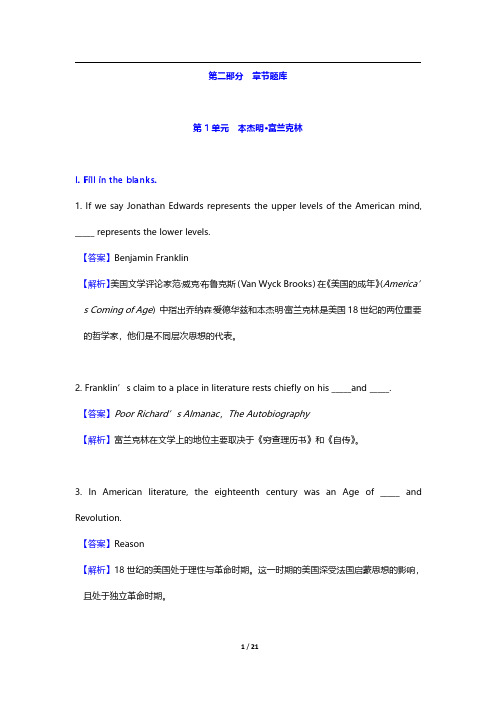
第二部分章节题库第1单元本杰明·富兰克林І.Fill in the blanks.1.If we say Jonathan Edwards represents the upper levels of the American mind, _____represents the lower levels.【答案】Benjamin Franklin【解析】美国文学评论家范·威克·布鲁克斯(Van Wyck Brooks)在《美国的成年》(America’s Coming of Age)中指出乔纳森·爱德华兹和本杰明·富兰克林是美国18世纪的两位重要的哲学家,他们是不同层次思想的代表。
2.Franklin’s claim to a place in literature rests chiefly on his_____and_____.【答案】Poor Richard’s Almanac,The Autobiography【解析】富兰克林在文学上的地位主要取决于《穷查理历书》和《自传》。
3.In American literature,the eighteenth century was an Age of_____and Revolution.【答案】Reason【解析】18世纪的美国处于理性与革命时期。
这一时期的美国深受法国启蒙思想的影响,且处于独立革命时期。
4.Franklin was the epitome of the_____,the versatile,practical embodiment of national man in the18th century.【答案】Enlightenment【解析】富兰克林是启蒙思想的缩影,是18世纪理性的代表。
5.Benjamin Franklin’s best writing is found in his masterpiece_____.【答案】The Autobiography of Benjamin Franklin【解析】本杰明·富兰克林文学上最大的成就体现在他的作品《本杰明·富兰克林自传》上。
陶洁《美国文学选读》(第3版)笔记和课后习题详解(第10单元 斯蒂芬
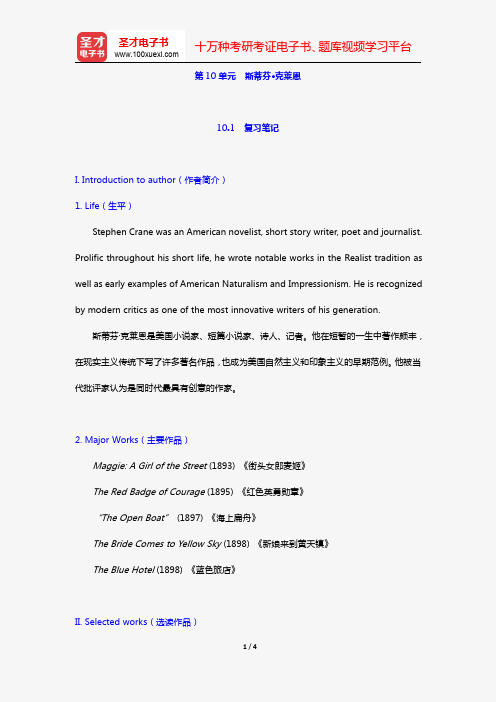
第10单元斯蒂芬•克莱恩10.1复习笔记I.Introduction to author(作者简介)1.Life(生平)Stephen Crane was an American novelist,short story writer,poet and journalist. Prolific throughout his short life,he wrote notable works in the Realist tradition as well as early examples of American Naturalism and Impressionism.He is recognized by modern critics as one of the most innovative writers of his generation.斯蒂芬·克莱恩是美国小说家、短篇小说家、诗人、记者。
他在短暂的一生中著作颇丰,在现实主义传统下写了许多著名作品,也成为美国自然主义和印象主义的早期范例。
他被当代批评家认为是同时代最具有创意的作家。
2.Major Works(主要作品)Maggie:A Girl of the Street(1893)《街头女郎麦姬》The Red Badge of Courage(1895)《红色英勇勋章》“The Open Boat”(1897)《海上扁舟》The Bride Comes to Yellow Sky(1898)《新娘来到黄天镇》The Blue Hotel(1898)《蓝色旅店》II.Selected works(选读作品)◆The Open Boat《海上扁舟》This story is based on Crane’s personal experiences.While traveling to Cuba to work as a newspaper correspondent during the Cuban insurrection against Spain, Crane was stranded at sea after his ship the Commodore sank off the coast of Florida.Stephen Crane and three others endured the rage of the sea for thirty hours. Billy Higgins a friend of Cranes drowned while swimming to shore.This realistic story of their life-threatening ordeal captures the emotions of four men in a fight against nature.The most significant aspect of this struggle lies in the men’s attempts to help one another survive when they are confronted with danger and disaster.故事取材于克莱恩真实的个人经历。
陶洁《美国文学选读》(第3版)笔记和课后习题考研真题详解
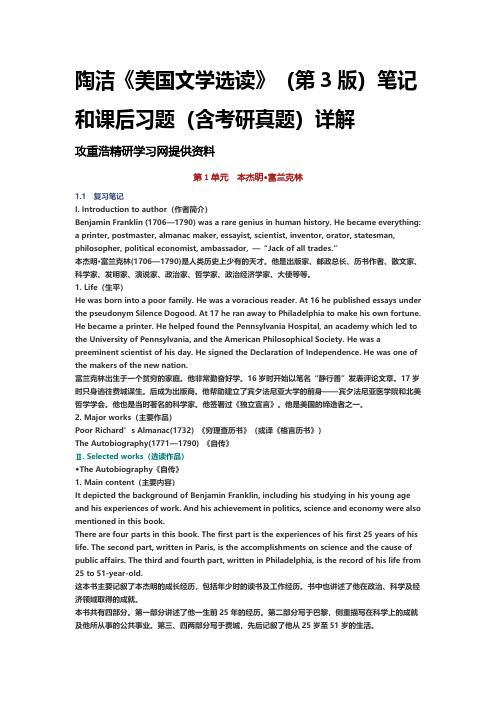
陶洁《美国文学选读》(第3版)笔记和课后习题(含考研真题)详解攻重浩精研学习网提供资料第1单元本杰明•富兰克林1.1复习笔记I.Introduction to author(作者简介)Benjamin Franklin(1706—1790)was a rare genius in human history.He became everything: a printer,postmaster,almanac maker,essayist,scientist,inventor,orator,statesman, philosopher,political economist,ambassador,—“Jack of all trades.”本杰明·富兰克林(1706—1790)是人类历史上少有的天才。
他是出版家、邮政总长、历书作者、散文家、科学家、发明家、演说家、政治家、哲学家、政治经济学家、大使等等。
1.Life(生平)He was born into a poor family.He was a voracious reader.At16he published essays under the pseudonym Silence Dogood.At17he ran away to Philadelphia to make his own fortune. He became a printer.He helped found the Pennsylvania Hospital,an academy which led to the University of Pennsylvania,and the American Philosophical Society.He was a preeminent scientist of his day.He signed the Declaration of Independence.He was one of the makers of the new nation.富兰克林出生于一个贫穷的家庭。
【免费下载】美国文学选读 第三版 课后习题答案 陶洁
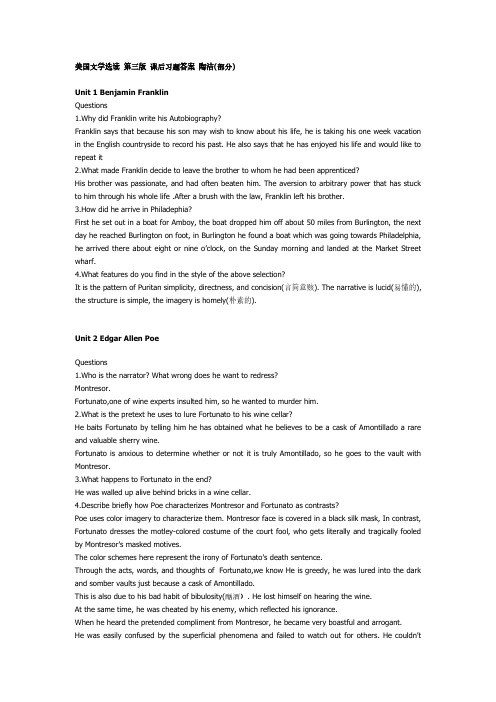
美国文学选读第三版课后习题答案陶洁(部分)Unit 1 Benjamin FranklinQuestions1.Why did Franklin write his Autobiography?Franklin says that because his son may wish to know about his life, he is taking his one week vacation in the English countryside to record his past. He also says that he has enjoyed his life and would like to repeat it2.What made Franklin decide to leave the brother to whom he had been apprenticed?His brother was passionate, and had often beaten him. The aversion to arbitrary power that has stuck to him through his whole life .After a brush with the law, Franklin left his brother.3.How did he arrive in Philadephia?First he set out in a boat for Amboy, the boat dropped him off about 50 miles from Burlington, the next day he reached Burlington on foot, in Burlington he found a boat which was going towards Philadelphia, he arrived there about eight or nine o’clock, on the Sunday morning and landed at the Market Street wharf.4.What features do you find in the style of the above selection?It is the pattern of Puritan simplicity, directness, and concision(言简意赅). The narrative is lucid(易懂的), the structure is simple, the imagery is homely(朴素的).Unit 2 Edgar Allen PoeQuestions1.Who is the narrator? What wrong does he want to redress?Montresor.Fortunato,one of wine experts insulted him, so he wanted to murder him.2.What is the pretext he uses to lure Fortunato to his wine cellar?He baits Fortunato by telling him he has obtained what he believes to be a cask of Amontillado a rare and valuable sherry wine.Fortunato is anxious to determine whether or not it is truly Amontillado, so he goes to the vault with Montresor.3.What happens to Fortunato in the end?He was walled up alive behind bricks in a wine cellar.4.Describe briefly how Poe characterizes Montresor and Fortunato as contrasts?Poe uses color imagery to characterize them. Montresor face is covered in a black silk mask, In contrast, Fortunato dresses the motley-colored costume of the court fool, who gets literally and tragically fooled by Montresor's masked motives.The color schemes here represent the irony of Fortunato's death sentence.Through the acts, words, and thoughts of Fortunato,we know He is greedy, he was lured into the dark and somber vaults just because a cask of Amontillado.This is also due to his bad habit of bibulosity(酗酒). He lost himself on hearing the wine.At the same time, he was cheated by his enemy, which reflected his ignorance.When he heard the pretended compliment from Montresor, he became very boastful and arrogant.He was easily confused by the superficial phenomena and failed to watch out for others. He couldn’ttolerate that others were stronger than him.For example, Montresor always stimulated him with Luchresi who was good at connoisseur(鉴赏)in wine.Under the impulse of vanity, he fell into Montresor’s terrible trap.In fact, he was careless and foolish and didn’t find that the danger was approaching him.He looked down upon Montresor and others.He didn’t realize his foolishness until the death was coming.Talking from the appearance, Monstresor was a well-educated and “kind” businessman.He enjoyed the honor and respect in the city. But in fact, he was an evil and awful person.His inner feelings were so cruel that they even made people tremble.Under his rich appearance was the dirty soul and despicable character.We couldn’t see any glorious virtues in his mind. Instead, his heart was cold and dark.It was the revenge that threw Montresor into the deep evil valley.unit 4 Nathaniel HawthorneQuestions :1.Why is the prison the setting of Chapter 1 ?No matter how optimistic the founders of new colonies may be, they are quick to establish a prison and a cemetery in their “Utopia,” for they know that misbehavior, evil, and death are unavoidable.This belief fits into the larger Puritan doctrine, which puts heavy emphasis on the idea of original sin—the notion that all people are born sinners because of the initial transgressions of Adam and Eve in the Garden of Eden. he is therefore using the prison building to represent the crime and the punishment which are aspect of civilized lifeWhat is the implication of the description of the roses?The rosebush symbolizes the ability of nature to endure and outlast man's activities.The narrator suggests that roses offer a reminder of Nature's kindness to the condemned; for his tale, he says, it will provide either a “sweet moral blossom” or else some relief in the face of unrelenting sorrow and gloom.2.Describe the appearance of Hester Prynne and the attitude of the people towards her.The second paragraph on page 30.The crowd in front of the jail is a mixture of men and women, all maintaining severe looks of disapproval.Several of the women begin to discuss Hester Prynne, and they soon vow that Hester would not have received such a light sentence for her crime if they had been the judges.One woman, the ugliest of the group, goes so far as to advocate death for Hester.3.What has happened to Hester?As a young woman, Hester married an elderly scholar, Chillingworth, who sent her ahead to America to live.While waiting for him, she had an affair with a Puritan minister named Dimmesdale, after which she gave birth to Pearl.The scarlet letter is her punishment for her sin and her secrecy.Why does she make the embroidery of the letter A so elaborate?It seems to declare that she is proud, rather than ashamed, of her sin.In reality, however, Hester simply accepts the “sin” and its symbol as part of herself, just as she accepts her child.And although she can hardly believe her present “realities,” she takes them as they are rather than resisting them or trying to atone for them.How does this tell us about her character?Throughout The Scarlet Letter Hester is portrayed as an intelligent, capable. It is the extraordinary circumstances shaping her that make her such an important figure.Unit5 Herman MelvilleQuestions1.What are the stories Ismael tells about Moby Dick?Ishmael compares the legend of Moby Dick to his experience of the whale.He notes that sperm whale attacks have increased recently and that superstitious sailors have come to regard these attacks as having an intelligent, even supernatural origin.In particular, wild rumors about Moby Dick circulate among whalemen, suggesting that he can be in more than one place at the same time and that he is immortal. Ishmael remarks that even the wildest of rumors usually contains some truth.Whales, for instance, have been known to travel with remarkable speed from the Atlantic to the Pacific; thus, it is possible for a whale to be caught in the Pacific with the harpoons of a Greenland ship in it. Moby Dick, who has defied capture numerous times, exhibits an “intelligent malignity”(狠毒)in his attacks on men2.Why does Ahab react so violently against the white whale?First, he lost one of his legs because of the white whale.Second,He considers Moby Dick the embodiment of evil in the world, and he pursues the White Whale,because he believes it his inescapable fate to destroy this evil.Ishmael suggests that Ahab is “crazy”and call him “a raving lunatic.” Do you agree with him? Why or why not?Ishmael describes Ahab as mad in his narration, and it does indeed seem mad to try to fight the forces of nature or God.3.What narrative features can you find in the selected chapter?In the selected charpter, Melville employed the technique of multiple view of his narrative to portray Moby Dick to achieve the effect of ambiguity and let readers judge the meaning.Unit 6 Henry David ThoreauQuestions1.Where indeed did Thoreau live, both at a physical level and at a spiritual level?He lived in a cabin on Walden Pond, which belonged to Emerson’s property.2.Had Thoreau ever bought a farm? Why did he enjoy the act of buying?No, he hadn’t.He avoided purchasing a farm because it would inevitably tie him down financially and complicate his life.Thoreau didn’t see the acquisition of wealth as the goal for human existence, he saw the goal of life to be an exploration of the mind and of the magnificent world around us.He regarded the places as an existence free of obligations and full of leisure.3.Is it significant that Thoreau mentioned the Fourth of July as the day on which he began to stay in the woods? Why?Yes, it is.Because The Fourth of July is known as Independence Day,the birthday ot the United States.Here Thoreau uses the day to express his beginning of regeneration at Walden.It also means a symbol of his conquest of being.4.How could you answer the question Thoreau asked at the end of this selection?Unit 7 19th Century American Poets1. Henry Wadsworth Longfellow(1) I Shot an Arrow…1. Why did the speaker lose sight of his arrow and song?The arrow flies too swiftly and too far away to be seen by the speaker; whereas the song is naturally invisible.2. In what circumstances did he find them again?He finds them unexpectedly years later from the trunk of a tree and the heart of a friend.3. What do arrow and song stand for in this poem?The images of arrow and song here may stand for friendship.(2) A Psalm of Life1. What kind of person is the speaker of this poem?The speaker is a man of action, always optimistic and cheerful, trying to achieve as much as possible in the short span of life.2. According to the poem, how should our lives be led to overcome the fact that each day brings us nearer to death?We should work harder and live happier.3. Interpret the metaphor of "Footprints on the sand of time" (line 28).The metaphor refers to human deeds in real life.2. Walt Whitman(1)One's Self I Sing1. What is the significance of singing about one's self?It is an exaltation of the individual spirit, which is typical of American people.2. What is the difference between physiology and physiognomy?Physiology is a science that deals with the functions and life process of human beings, whereas physiognomy refers to an art of judging character from contours of face itself or the appearance of a person.3. What does Whitman mean by the term of "the Modern Man"?He means that a man should be free from any prejudice and pride, totally different from the traditional one, that is full of bias.(3) O Captain! My Captain!1. Why is the word "Captain" capitalized throughout the poem?In this poem the word “Captain” specially refers to Abraham Lincoln, president of the United States. 2. What overall metaphor does the poet employ in this poem?Life is a journey.3. Why do people on the shores exult and bells ring, while the speaker remains so sad?They welcome the ship returning from its hard trip, whereas the speaker is sad because the captain fails to receive his own honor.3.Emily Dickinson(1) To Make a Prairie …1. What things are needed to "make" a prairie? In what sense can one really do it?Some grass and insects and small animals. People can make a prairie with their imagination.2. How can "revery alone" create a prairie?The prairie stays in one's mind.(2) Success Is Counted Sweetest1. Why is success "counted sweetest by those who ne'er succeed"?Those who have tasted the bitterness of failure would have a keener desire for success.2. Who are "the purple host"?The so-called successful people in the world.3. Who is "he" in the last stanza?Anyone who is pursuing his success.(3) I'm Nobody!1. Who are the "pair of us" and "they" in this poem? The "pair of us" refers to the speaker in the poem and the reader, and "they" refers to the public, especially those in power.2. What does "an admiring bog" really mean?" (line 28).It Implies the vain and empty common people, who are always admiring and pursuing the celebrities.3. What is the theme of this poem?The real admirable life is a secluded and common one.4. Do you want to be "nobody" or "somebody"? Explain your reasons.Different persons would have different answers to this question. Personally, I prefer to be nobody. Unit 8 Mark TwainQuestions1: Why do you think Mr.Wheeler is so eager to tell these stories?From Mr.Wheeler’s behaviors and contents of his narration we can know he is so eager to tell these stories.First, when "I" asked him to tell "me" something about W.Smiley, he “ backed me into a corner and blockaded me with his chair, and then sat down and reeled off the narrative”. And during theprocess of telling his stories, he never paid any attention to others'response to his story and just went on telling what amused him. At last when the listener felt boring and wanted to leave, Mr.Wheeler even didn't notice it and still asked him to sit there listening to him.Question2: Does his audience share his enthusiasm in telling the stories? No. the audience does not show any interest in Mr.Wheeler’ stories. In fact, the narrator was very feverish about his stories, but ,in the eyes of the listener,the stories were very boring and had nothing to do with his preoccupation. As an educated man, the listener couldn't understand the way of laborers for joy, and he would never bother himself to understand it. So after the long time of Mr.Wheeler’ solo narration and when the audience got a chance, he fled away.Question3: Do you think the narrator and his listener ever suspect the presence of humor? Why? How do you interpret their interactions? The narrator and his listener never noticed or suspected the presence of humor.During the intercourse,the narrator went vigorously on his monotonous narrative "wihout a little smiling" talking about the animals and the things like ,while the listener felt rather puzzled or bothered by his stories.It seemed to be kind of coarse things. So the two different scenes go on separately without a intersection.And their interaction was a complete failure according toour common sense about communication.But it in this sense produced the effect of humor which can be tasted by our readers due to the skills adopted by Mark Twain .Unit 14 F·Scott Fitzgerald1.Do you think Gatsby deserves to be called “the great”? Why?(1)I think it is too complicated to simply say Gatsby deserves to be ―great‖ or not.For one thing, Gatsby was ambitious, hardworking, generous and passionate. He was so extremely loyal to his love and Daisy that he could do anything to get Daisy back: he did shady business to earn money and social position; he threw luxurious parties just to draw Daisy’s attention; he could take the blame for a death that he did not cause.(2)In this respect, he is much ―greater‖ than his contemporaries. For another thing, Gatsby never realized that Daisy wasn’t the girl he loved anymore. Gatsby was so innocent that he staked everything on his dreams, not realizing that his dreams are unworthy of him. He wasn’t sober enough to be great.2.Does “the green light” Gatsby believed in exist in reality? Why or why not ?(1)I think ―the green light‖ does not exist in reality. Because the green light which situated at the end of Daisy’s East Egg dock and barely visible from West Egg lawn represents Gatsby’s unattainable dream. Although the color itself can be seen as hope and bright future, Gatsby’s quest for Daisy back is doomed to be impossible. Daisy lived in ―a material world without being real, where poor ghosts, breathing dream like air‖.(2)After five years when Gatsby met Daisy again, the miracle Daisy had lost her original glory. Therefore, there is no delaying that Gatsby’s dream would not come true. In the novel, the green light not only represents that innocent Gatsby looked forward to the future, but also means his longing for the history –his happy past with Daisy. The distinction between ideal and reality was huge. As if American dream between golden past and golden future always suffered from the realistic betrayal and crush.3.What does Gatsby’s Schedule reveal about him and how does it relate to the American Dream?(1)The schedule is a reflection of Gatsby’s determination and ambition. It reveals that he is hard on himself in pursuit of his goal—to be an upper-class man.(2)On one hand, we can know that he is persistent in pursuing his American Dream-- to attain wealth and happiness through his struggle. On the other hand, he is too idealistic and naive.(3)He tries his best to make money and learns everything required to be an upper-class man so that he can get access to his beloved girl.Money is important,but there are other barriers difficult to penetrate. The girl he loves is as vulgar and superficial as others in her circle, she is unable to meets Gatsby’s romantic fantasy. So his dream is destined to shatter, which indicates the disillusion of American Dream.4.When you read the line “He (the man with owl-eyed glasses) took off his glasses and wiped them again, outside and in ,” what images does it create in your mind, given the novel’s numerous references to the strikingly strange scene of the spectacled eyes?(1)From this line , superficially, owl-eyes is a person with thick and blurry glasses who can not see clearly all the things in the world. However, we know he is actually an owl-wise observer and sees more clearly than anyone else in the novel. Owl-Eyes, except Nick, is the only friend to appear at the rain-soaked burial of Gatsby, when others are unwilling to come. He feels sympathy for Gatsby’s tragedy.(2)After reading this line, I cannot help thinking of the Dr.Eckleburg billboard with its huge yellow spectacles in this novel. In many rainy days, Dr. Eckleburg’s eyes are also dimmed and seem blind. But in fact this is a pair of "all-seeing" eyes. The Owl-Eyed Man is similar to Dr. Eckleburg, sadly looking at the people’s life and idealism of this time. Both of them symbolize an uninvolved spectator god. They watch all the activities of the humans. Owl-eyes is the avatar of the sightless Dr. Eckleburg.Unit 16 Ernest Hemingway1. How do you interpret the irony of the title after reading the story?(1)The title ―A Clean Well-Lighted Place‖ refers to the café in the text. The café was very clean and well- lighted. From the literary meaning, we may feel this place was very warm and comfortable, was a place where people need warmth wanted to go. So the old man, who was rich but deaf and lonely came here to find warmth and avoided nada. It was the only place he could go and could findsome comfort.(2)However, the younger waiter was very selfish. As his wife was waiting him on the bed, he wanted to go home early. Therefore, he refused to offer the old man another cup of wine by the excuse that the business was finished. In fact, there was still an hour from closing time. The younger thought an hour was more important to him than to the old man. The old man needed to leave the only place where he could get far away from nada/ nothing. This café should be warm but the younger waiter forced the lonely and deaf to leave without any sympathy. This is the irony of the title.2. Do you think youth and confidence can help one withstand the metaphorical dark?Why or why not? (1)I don’t think so.In our opinion, the metaphorical dark means nada,nothing in one’s inner heart. In the article, the younger waiter had both youth and confidence; however, he never made full use of them. As we can see, he didn’t understand the old man’s suicide and excessive drinking, and failed to see his tomorrow through the old man’s present situation.(2)What’s more, he had no idea that youth is not permanent, which cannot guarantee love and work. From above, there is no denying that he didn’t realize his nada. Therefore, his youth and confidence never contributed to withstanding his metaphorical dark.(3)I think that, nowadays, youth and confidence do can help to withstand the metaphorical dark, for one can bravely face the reality and overcome the nada with youth and confidence. But they only serve as two main factors. In fact, we need some other factors such as courage, dignity and so on if we want to withstand the metaphorical dark successfully.3.The older waiter said to the younger waiter:“We are of two different kinds.” In what way do you think they are different?(1)I think they are different from each other in the following four aspects:In the beginning, they are in different ages.The older waiter was in his middle age; while the other was much younger.(2)Then, they have different attitudes towards the old man. From the article, we know the older waiter had suffered a lot. He had maintained a clean and well-lighted place in his heart, and he could understand the old man and show sympathy to him. However, the young man was very selfish. He wanted to go home early so that he finished the business one hour earlier and forced the old man to leave. He showed hatred rather than sympathy to the old man.(3)Next, they have different attitudes towards life. The older waiter had a deep sense of life. He was brave and wanted to fight again nada. Besides, he cared about others. The younger one was totally different; he has a shadow understanding of life. He satisfied with his present love and work, he only care about himself and was reluctant to take others into consideration. He even never thought of his future.(4)Finally, they have different attitudes towards nada. The older waiter had realized that it is impossible to avoid nada in one’s whole life. The only thing he can do is to keep a kind of clearness in his own mind. So he was willing to work late for the lonely old man and was pleased to help those who are suffering nada. But out of youth and confidence, he failed to overcome nada. On the contrary, the younger waiter had the two most important factors for withstanding nada; however, he didn’t realize the nada in his heart at all. Then his youth and confidence became useless.Unit 17 20th -Century American Poets1. Ezra Pound In A Station of the Metro1. Why does the poet call the faces of pedestrians "apparition"?These pedestrians are all walking in a hurry amidst the drizzling rain.2. What do "petals" and "bough" stand for? Petals refer to the faces while the bough stands for the floating crowd.2. Wallace Stevens Anecdote of the Jar1. What does the jar in poem symbolize? Why does the speaker place it on top of a hill? The jar here symbolizes a certain perspective on looking at this world. If the perspective of the viewing is creative and unique, it will change the conventional order of the old world. When a new perspective comes out, it will certainly hold attention from the rest.2. The jar is "round" and "of a port in air," meaning that it has a stately importance. What effect does it have on surroundings when placed on the ground? Maybe the round jar assumes the air of a domineering figure, which helps to form a certain order out of the disordered surrounding.3. How did the wilderness of Tennessee characterized? What words or phrases does the poet use to describe it? Tennessee seems to a place full of life and energy. “Slovenly,” “sprawl” and “wild” are some of the words used to describe the place. (See Anecdote of the Jar )4.Robert Frost(1)Fire and Ice1. What are the symbolic meanings of fire in this poem? Fire symbolizes natural disaster, human passion, as well as war.2. Why does the speaker say that ice is also great for destruction? Explain what ice stands for here. Ice, oppose to fire, is also a dreadful natural disaster in this world, and ice is always related to indifference, coldness, hatred, and the other negative sentiments of human beings.3. What is your opinion about fire and ice? Which one is more destructive? Both fire and ice can destroy this beautiful world if they are beyond control of human beings. Therefore we should be open-minded and reduce our prejudice and pride so as to keep this world in peace.(2)Stopping By Woods On a Snowy Evening1. In your opinion, what was the reason that made the speaker stop by the woods on a snowy evening? The poet was deeply attracted by the natural beauty of the scene at that very moment.2. Why did the horse give the harness bell a shake? The horse grew impatient by stopping in the middle of the dark, cold woods at midnight. It was eager to go home.3. Why couldn't the speaker stay longer by the woods to appreciate its mysterious beauty? He realized that it was late at night and he would have to hurry home to get some food and sleep, because the next morning he would have a lot of work to do.4. What is the effect of repetition in the last two lines? The refrain-like repetition in the last two lines reminds the reader a simple fact of life: whatever happens, one must go forward in the journey of his or her life.(3) The Road Not Taken1. What is the speaker's initial response to the divergence of the two roads? The speaker is at a loss which road he should choose, and he feels sorry that he cannot explore both roads at the same time.2. Describe the similarities and differences of these two roads. Which one does the speaker take? Two roads are similar except one of them is more “grassy,” which implies that it is less traveled by people. The speaker prefers the less traveled one, because he likes adventure.3. What might the two roads stand for in the speaker's mind? One road stands for the traditional one and the other is unconventional one and full of challenges and difficulties. To follow other people's footsteps or to open a new road for himself is really not an easy decision for us to make in our lives.Unit22 Allen GinsbergAll through the poem, the speaker is addressing to Walt Whitman. Is this poem about Walt Whitman or about modern America?-----from Allen Ginsberg A Supermarket in CaliforniaThe author in this poem wanted to emphasis his theme about showing his respect to the passed age and showing his worry about the corrupt in the part of spirit and society. As we all know, Walt Whitman’s poetry was a revolution in American literature can be seen in the first publication of Leaves of Grass in 1855. His poetry is “free verse” in that the lack of meter and rhyme is known as his major technical innovation. Allen Ginsberg had a highly praise on him. As the movement of Beat Generation, Allen Ginsberg used poetry as weapon to express his own understanding of Beat---beatific and beat down.In this poem, the author wrote the sentence “shopping for images”. What he wanted to buy is the things which were listed by Walt Whitman many years ago. What is in the supermarket? The fresh fruits on the shelf fit the needs of customers and the families. We across a strange statement: shopping for images. How can we shop for images? What he refers to us is still the pure image---“dreaming of your enumerations”. The things on the shelf are the images of languages in Walt Whitman’s poetry. The language in Walt Whitman’s poetry and the spirit in his poetry are the things which Allen Ginsberg dreamed of. A young America which is full of energy is worth being praised. Allen Ginsberg found the song of himself, the song full of courage and the echo of the real world among Walt Whitman’s work. The meaning of age in this poem is that the nation or the race opens the age which belongs to them and creates the history of them own. To a certain extend, the age singer equals the national singer. The world is the world which has its features of timing and events. This means that the link of combining the world is not the same as the goods on the shelf but the things which contain the world and individual spirits.There is a difference between Walt Whitman’s poetry and the successor’s poetry.The former poetry focused on the point of the combing of the poetry and the real world. It extended the full of fruit of the history through he understood the meaning of lives living on earth.The latter’s poetry showed that the nature of material has been deprived from the former world. Our moral and spirit has become the goods in the supermarket or the desire in every family in the capitalism nations. Allen Ginsberg recalled the dream of poetry and moral in Walt Whitman’s age.In this poem, Allen Ginsberg imaged Walt Whitman passing through the death to come to the age which was so called the Golden Age of America. What he can see? How can he do? Would he care about the price and market’s conditions as the American middle-aged women? Allen Ginsberg follows Walt Whitman in the supermarket, but never reached the collection office. They did not like the goods which had been deprived the nature of them but pursuit the things which existed front their eyes and enjoyed the pleasure of nature.。
陶洁《美国文学选读》(第3版)【章节题库】-第8~16单元【圣才出品】

第8单元马克·吐温I. Fill in the blanks.1. The best work that Mark Twain ever produced is_____, which was a success from its fast publication in 1884, and has always been regarded as one of the great books of western literature and western civilization. (人大2006研)【答案】Adventures of Huckleberry Finn【解析】马克·吐温的最著名的代表作是《哈克贝利·费恩历险记》。
2. One of Samuel Langhorne Clemens’best books _____ is built around his experiences as a steam boat pilot.【答案】Life on the Mississippi【解析】马克·吐温的凭着年轻时驾驶河船的经验,写成了脍炙人口的自传《密西西比河上的生活》。
以密西西比河及沿岸的城镇为背景,生动地写下作者的生活体验、童年岁月以及他所热爱的乡土。
3. Mark Twain once described the theme of a book as the struggle between a healthy heart and a deformed conscience, and he attributed this description to the character _____ in that book. (首师大2008研)【答案】Huckleberry Finn【解析】马克吐温曾说《哈克贝利·费恩》这部小说的主题是健康的心灵与扭曲的良心之间的斗争,他这段描述是针对小说主人公哈克贝利·费恩而言的。
陶洁《美国文学选读》(第3版)笔记和课后习题详解(第24单元 索尔
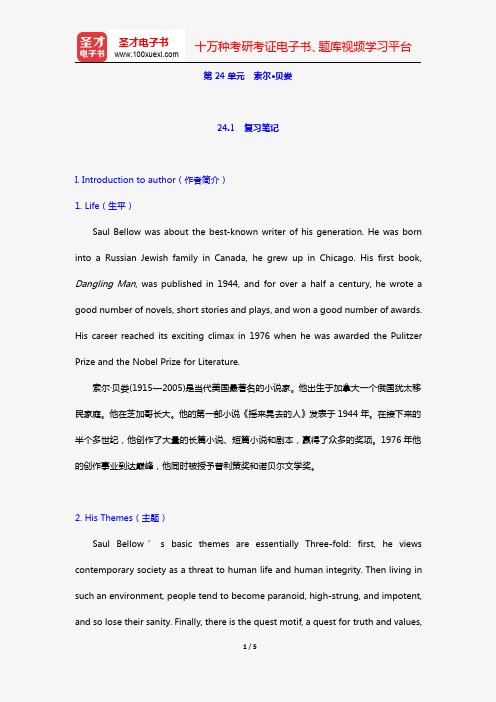
第24单元索尔•贝娄24.1复习笔记I.Introduction to author(作者简介)1.Life(生平)Saul Bellow was about the best-known writer of his generation.He was born into a Russian Jewish family in Canada,he grew up in Chicago.His first book, Dangling Man,was published in1944,and for over a half a century,he wrote a good number of novels,short stories and plays,and won a good number of awards. His career reached its exciting climax in1976when he was awarded the Pulitzer Prize and the Nobel Prize for Literature.索尔·贝娄(1915—2005)是当代美国最著名的小说家。
他出生于加拿大一个俄国犹太移民家庭。
他在芝加哥长大。
他的第一部小说《摇来晃去的人》发表于1944年。
在接下来的半个多世纪,他创作了大量的长篇小说、短篇小说和剧本,赢得了众多的奖项。
1976年他的创作事业到达巅峰,他同时被授予普利策奖和诺贝尔文学奖。
2.His Themes(主题)Saul Bellow’s basic themes are essentially Three-fold:first,he views contemporary society as a threat to human life and human integrity.Then living in such an environment,people tend to become paranoid,high-strung,and impotent, and so lose their sanity.Finally,there is the quest motif,a quest for truth and values,difficult,excruciating,but successful in a way.索尔·贝娄的主题主要是如下三方面:首先,他认为当代社会对人们的生活和独立人格是个威胁。
陶洁《美国文学选读》(第3版)笔记和课后习题(含考研真题)详解-第1~6单元【圣才出品】
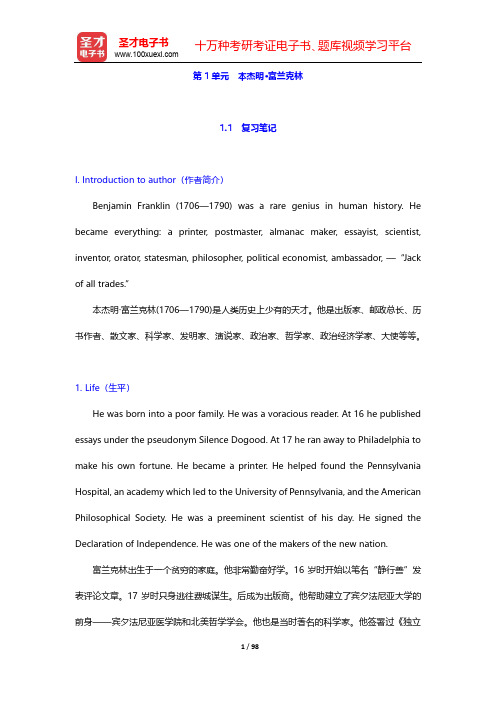
第1单元本杰明•富兰克林1.1 复习笔记I. Introduction to author(作者简介)Benjamin Franklin (1706—1790) was a rare genius in human history. He became everything: a printer, postmaster, almanac maker, essayist, scientist, inventor, orator, statesman, philosopher, political economist, ambassador, —“Jack of all trades.”本杰明·富兰克林(1706—1790)是人类历史上少有的天才。
他是出版家、邮政总长、历书作者、散文家、科学家、发明家、演说家、政治家、哲学家、政治经济学家、大使等等。
1. Life(生平)He was born into a poor family. He was a voracious reader. At 16 he published essays under the pseudonym Silence Dogood. At 17 he ran away to Philadelphia to make his own fortune. He became a printer. He helped found the Pennsylvania Hospital, an academy which led to the University of Pennsylvania, and the American Philosophical Society. He was a preeminent scientist of his day. He signed the Declaration of Independence. He was one of the makers of the new nation.富兰克林出生于一个贫穷的家庭。
美国文学选读考研教材练习题库
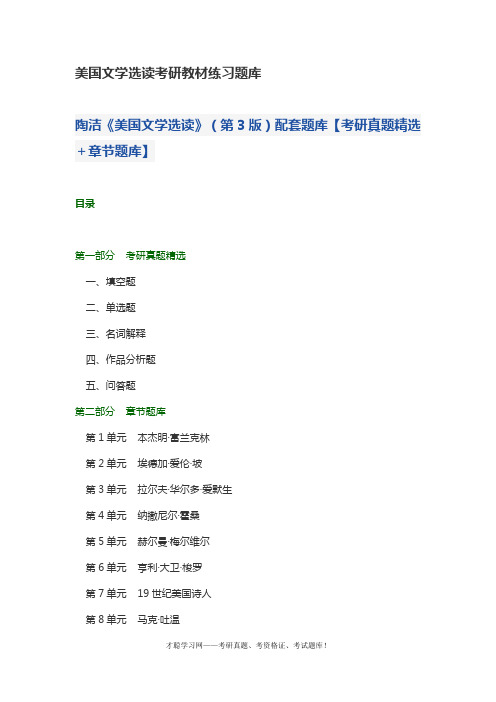
美国文学选读考研教材练习题库陶洁《美国文学选读》(第3版)配套题库【考研真题精选+章节题库】目录第一部分考研真题精选一、填空题二、单选题三、名词解释四、作品分析题五、问答题第二部分章节题库第1单元本杰明·富兰克林第2单元埃德加·爱伦·坡第3单元拉尔夫·华尔多·爱默生第4单元纳撒尼尔·霍桑第5单元赫尔曼·梅尔维尔第6单元亨利·大卫·梭罗第7单元19世纪美国诗人第8单元马克·吐温第9单元亨利·詹姆斯第10单元斯蒂芬·克莱恩第11单元薇拉·凯瑟第12单元舍伍德·安德森第13单元凯萨琳·安·波特第14单元弗·斯科特·菲茨杰拉德第15单元威廉姆·福克纳第16单元厄内斯特·海明威第17单元20世纪美国诗人(1)第18单元尤金·格拉斯通·奥尼尔第19单元埃·布·怀特第20单元田纳西·威廉斯第21单元拉尔夫·华尔多·埃利森第22单元20世纪美国诗人(2)第23单元阿瑟·米勒第24单元索尔·贝娄第25单元约瑟夫·海勒第26单元托尼·莫里森第27单元路易丝·厄德里克•试看部分内容考研真题精选一、填空题1. In his autobiography, _____creates the image of a self-made man and demonstrates his belief that the new world of America was a la nd of _____which might be met through hard work and wise manag ement.[天津外国语学院2011研]【答案】Benjamin Franklin, opportunities查看答案【解析】富兰克林是美国启蒙时期与独立战争时期的代表人物。
陶洁《美国文学选读》课后习题详解(19世纪美国诗人)【圣才出品】
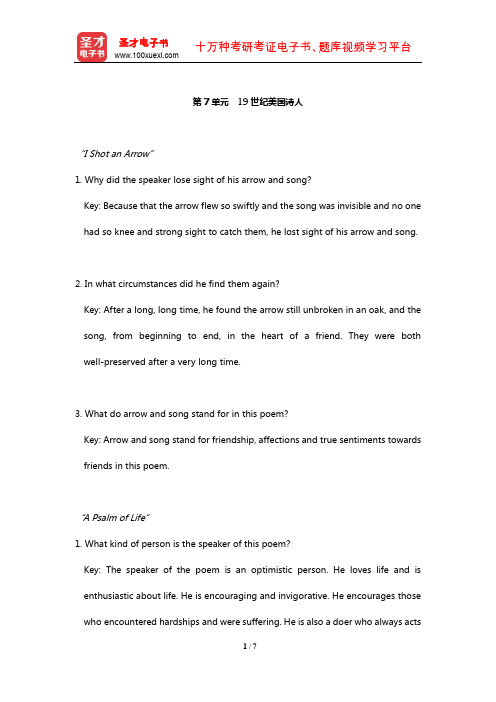
第7单元19世纪美国诗人“I Shot an Arrow”1. Why did the speaker lose sight of his arrow and song?Key: Because that the arrow flew so swiftly and the song was invisible and no one had so knee and strong sight to catch them, he lost sight of his arrow and song.2. In what circumstances did he find them again?Key: After a long, long time, he found the arrow still unbroken in an oak, and the song, from beginning to end, in the heart of a friend. They were both well-preserved after a very long time.3. What do arrow and song stand for in this poem?Key: Arrow and song stand for friendship, affections and true sentiments towards friends in this poem.“A Psalm of Life”1. What kind of person is the speaker of this poem?Key: The speaker of the poem is an optimistic person. He loves life and is enthusiastic about life. He is encouraging and invigorative. He encourages those who encountered hardships and were suffering. He is also a doer who always actsrather than yearns for future and makes plan for it. He knows that a person should “be up and doing, with a heart for any fate” and keep achieving and pursuing, and learning to labor and wait.2. According to the poem, how should our lives be led to overcome the fact that each day brings us nearer to death?Key: According the poem, “life is real, life is earnest! And the grave is not its goal.” Although we go towards death every day, it is not our destination, for the aim of life of ours is to pursue, achieve and improve ourselves. That is, “but to act, that each tomorrow / Find us farther than today.” So, we should“Be a hero in the strife” and “act in the living present!”3. Interpret the metaphor of “Footprints on the sand of time” (line 28).Key: “The sand of time”refers to the lifetime of a man. If a man has done nothing and achieved nothing, his whole life would be empty and worthless. There was no any “footprints”. “Footprints on the sand of time” refers a person’s traces of struggle and his ac hievement recognized by others.“Sonnet-To Science”1. What kind of image does science have in this poem?Key: According to the poem, science is “the daughter of Old Time” and changes all things with its “peering eyes”. It becomes formidable adversary toimagination and poetry, because it stops the poets’ wandering in the jeweled shies.2. According to Poe, what will a poet do, if he is free from the bondage of science? Key: If a poet is free from the bondage of science, he will wander in the jeweled skies to seek treasure, that is, writing materials, for his poems, and have the summer dream beneath the tamarind tree so as to send his imaginations fly.3. What might science deprive the speaker of?Key: Science might deprive the speaker of “wandering” and “the summer dream beneath the tamarind tree”, because science, like a vulture, preys “upon the poet’s heart” and it also ruins many beautiful legends. Science explains everything in a scientific way, leaving poets no place to imagine and wander. In the end, the speaker even cannot dream under the tamarind tree.“To Helen”1. Why does the poet compare Helen’s beauty to “those Nicean barks of yore”? Key: Because the poet thinks that Helen is a classical beauty and “those Nicean barks of yore” implies the same kind of beauty, which is gentle, dreamy and heart-shaking.2. What have brought the wayfaring speaker home?Key: Helen’s “hyacinth hair, classic face and Naiad airs” have brou ght the wayfaring speaker home.3. In what form does Helen appear in the final stanza? Why does she carry a lamp in her hands?Key: She stands “in yon brillia nt window-niche” like a statue.Because now, she appears in the incarnation of Psyche, who was very curious about his husband and carried a lamp to see him. And here, the poet reproduces the classic scene of the mythology so as to make Helen mysterious.One’s Self I Sing1. What is th e significance of singing about one’s, self?Key: Singing about one’s self is celebrating human beings’ individual spirit, which is typical of American people. This exaltation puts mankind at the first place and increases their confidence and self-esteem.2. What is the difference between physiology and physiognomy?Key: Physiology is a science that deals with the functions and life process of human beings, whereas physiognomy refers to an art of judging character from contours of face itself or the appearance of a person.3. What does Whitman mean by the term of “the Modern Man”?Key: He means that “the Modern Man” should be free from any prejudice and pride, totally different from the traditional one who is full of bias. The life of “the Modern Man” is full of passion, pulse and power, and people’s action are cheerful and freest under the divine laws.“O Captain! My Captain!”1. Why is the word “Captain” capitalized throughout the poem?Key: Because, in this poem, the word “Captain” especially refers to Abraham Lincoln, president of the United States.2. What overall metaphor does the poet employ in this poem?Key: The poet compares America to be the ship on the sea, and the sea symbolizes the Civil War of America. President, Abraham Lincoln, is compared to be the “Captain”, who is killed just before the victory.3. Why do people on the shores exult and bells ring while the speaker remains so sad?Key: Because people on the shore welcome the ship returning from its hard trip, whereas the speaker is sad because the captain fails to receive his own honor.“To Make a Prairie”1. What things are needed to “make” a prairie? In what sense can one really do it?Key: It needs grass and insects. One can really do it by imagination.2. How can “revery alone” create a prairie?Key: By imagination, everything on a prairie can come into our mind, and thus, we can create a prairie.“Success Is Counted Sweetest”1. W hy is success “counted sweetest by those who never succeed”?Key: Because those who never succeed have a strong desire to succeed and they think that being successful is the most meaningful and worthy thing that they pursue. For them, success is the most attractive goal and is counted sweetest.2. Who are “the purple host”?Key: “The purple host” refers to those so-called successful people in the world.3. Who is “he” in the last stanza?Key: “He” refers to anyo ne who is pursuing his success.“I’m Nobody!”1. Who are the “pair of us” and “they” in this poem?Key: The “pair of us” refers to the speaker in the poem and the reader. “They” refers to the public, especially those in power.。
陶洁《美国文学选读》(第3版)笔记和课后习题详解(第1单元 本杰明
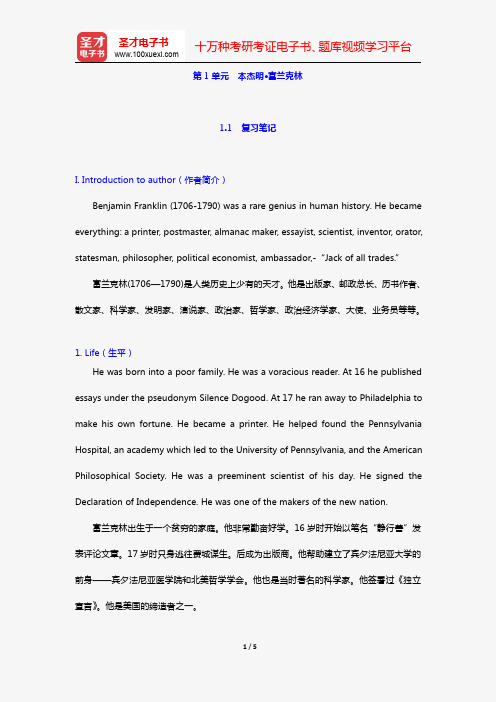
第1单元本杰明•富兰克林1.1复习笔记I.Introduction to author(作者简介)Benjamin Franklin(1706-1790)was a rare genius in human history.He became everything:a printer,postmaster,almanac maker,essayist,scientist,inventor,orator, statesman,philosopher,political economist,ambassador,-“Jack of all trades.”富兰克林(1706—1790)是人类历史上少有的天才。
他是出版家、邮政总长、历书作者、散文家、科学家、发明家、演说家、政治家、哲学家、政治经济学家、大使、业务员等等。
1.Life(生平)He was born into a poor family.He was a voracious reader.At16he published essays under the pseudonym Silence Dogood.At17he ran away to Philadelphia to make his own fortune.He became a printer.He helped found the Pennsylvania Hospital,an academy which led to the University of Pennsylvania,and the American Philosophical Society.He was a preeminent scientist of his day.He signed the Declaration of Independence.He was one of the makers of the new nation.富兰克林出生于一个贫穷的家庭。
陶洁《美国文学选读》笔记和课后习题(含考研真题)详解(亨利 詹姆斯)【圣才出品】
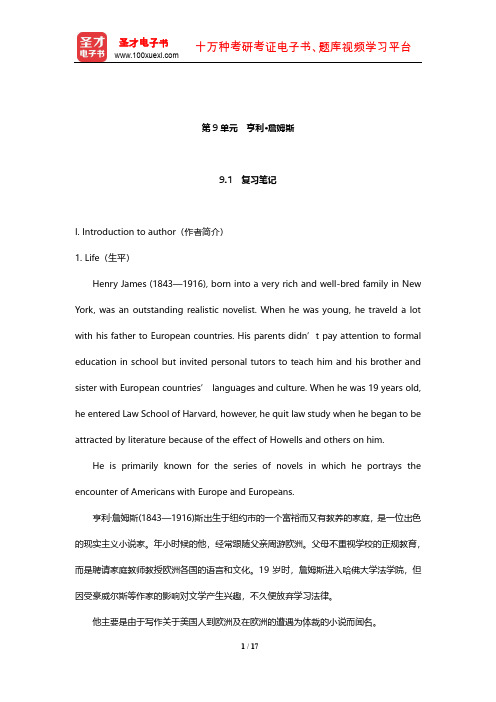
第9单元亨利•詹姆斯9.1 复习笔记I. Introduction to author(作者简介)1. Life(生平)Henry James (1843—1916), born into a very rich and well-bred family in New York, was an outstanding realistic novelist. When he was young, he traveld a lot with his father to European countries. His parents didn’t pay attention to formal education in school but invited personal tutors to teach him and his brother and sister with European countries’ languages and culture. When he was 19 years old, he entered Law School of Harvard, however, he quit law study when he began to be attracted by literature because of the effect of Howells and others on him.He is primarily known for the series of novels in which he portrays the encounter of Americans with Europe and Europeans.亨利·詹姆斯(1843—1916)斯出生于纽约市的一个富裕而又有教养的家庭,是一位出色的现实主义小说家。
年小时候的他,经常跟随父亲周游欧洲。
- 1、下载文档前请自行甄别文档内容的完整性,平台不提供额外的编辑、内容补充、找答案等附加服务。
- 2、"仅部分预览"的文档,不可在线预览部分如存在完整性等问题,可反馈申请退款(可完整预览的文档不适用该条件!)。
- 3、如文档侵犯您的权益,请联系客服反馈,我们会尽快为您处理(人工客服工作时间:9:00-18:30)。
第10单元斯蒂芬•克莱恩10.1 复习笔记I. Introduction to author(作者简介)1. Life(生平)Stephen Crane was an American novelist, short story writer, poet and journalist. Prolific throughout his short life, he wrote notable works in the Realist tradition as well as early examples of American Naturalism and Impressionism. He is recognized by modern critics as one of the most innovative writers of his generation.斯蒂芬·克莱恩是美国小说家、短篇小说家、诗人、记者。
他在短暂的一生中著作颇丰,在现实主义传统下写了许多著名作品,也成为美国自然主义和印象主义的早期范例。
他被当代批评家认为是同时代最具有创意的作家。
2. Major Works(主要作品)Maggie: A Girl of the Street (1893) 《街头女郎麦姬》The Red Badge of Courage (1895) 《红色英勇勋章》“The Open Boat” (1897) 《海上扁舟》The Bride Comes to Yellow Sky (1898)《新娘来到黄天镇》The Blue Hotel (1898) 《蓝色旅店》Ⅱ. Selected works(选读作品)◆The Open Boat《海上扁舟》This story is based on Crane’s personal experiences. While traveling to Cuba to work as a newspaper correspondent during the Cuban insurrection against Spain, Crane was stranded at sea after his ship the Commodore sank off the coast of Florida. Stephen Crane and three others endured the rage of the sea for thirty hours. Billy Higgins a friend of Cranes drowned while swimming to shore. This realistic story of their life-threatening ordeal captures the emotions of four men in a fight against nature.Th e most significant aspect of this struggle lies in the men’s attempts to help one another survive when they are confronted with danger and disaster.故事取材于克莱恩真实的个人经历。
作为一名记者,古巴起义反抗西班牙时,他在前往古巴采访途中被搁浅在海上,因为他乘的船在弗罗里达海滨沉没。
斯蒂芬·克莱恩和其他三个人在海上经受住了海水长达三十个小时的暴虐。
克莱恩的一个朋友比利·希金斯在游上岸的途中不幸被淹死。
这个真实的故事对他们的生命造成严重的威胁,也激发了他们与自然对抗时的情感。
这种斗争最重要的意义在于人们面对危险和灾难时尽最大努力拯救别人的生命。
10.2 课后习题详解1. What does the opening sentence imply?Key: It implies the extremely dangerous and hard situation that they are faced with. They can only focus on the sea and do not once take their eyes off the ocean. They have to fight with the ocean with all their strength and attention.2. How does the following outburst contribute to the theme(s) of the story? “If I am going to be drowned—if I am going to be drowned—if I am going to be drowned. Why, in the name of the seven mad gods who rule the sea, was I allowed to come thus far and contemplate sand and trees? Was I brought here merely to have my nose dragged away as I was about to nibble the sacred cheese of life? It is preposterous. If this old ninny woman, Fate, cannot do better than this, she should be deprived of the management of men’s fortunes. She is an old hen who knows not her intention. If she has decided to drown me. why did she not do it in the beginning and save me all this trouble. The whole affair is absurd....But, no, she cannot mean to drown me. She dare not drown me. She cannot drown me. Not after all this work.”Key: The following outburst is a desperate one which shows the speaker’s rebellions and resentfulness to the seven gods of sea. He thinks that he would be unfairly treated if he is drowned. Through the story, the struggle between man and the natural world is the most apparent theme. In fact, the speaker knows that nature is powerful and ruthless, and it will not show sympathy nor punish anyone, so, he thinks that he must survive by his own efforts. He must save himself.3. In what way could the survivors be interpreters?Key: The survivors can be interpreters to interpret the relationships between man and nature. They went through the hard struggles with nature, so they would have a better understanding of nature and man.10.3 考研真题与典型题详解I. Fill in the blanks.1. In the novel entitled _____ written by _____, a boy dreams of glorious battle in theUnion Army in the Civil War. However, his initial confrontation with true war perplexes him. (大连外国语2008研;天津外国语学院2009研)【答案】The Red Badge of Courage;Stephen Crane【解析】克莱恩的小说《红色英勇勋章》以南北战争为背景,小说的主人公亨利怀着对战争的美妙幻想,参加了北方军队,但在最初真正面对战争的时候,他却失去了勇气,当了逃兵,后来他克服了恐惧心理,经过战火的洗礼,重新获得了自信和勇气。
2. ______, the first American naturalist, was not much influenced by the scientificapproach. He was a genius with amazing sympathy and imagination.【答案】Stephen Crane【解析】斯蒂芬·克莱恩是美国第一位自然主义作家,是一位极富同情心和想象力的天才。
3. All of Stephen Crane’s characters are controlled by ______. This is what makesCrane a “naturalist”.【答案】the environment【解析】斯蒂芬·克莱恩作品中所有人物都受制于环境,所以他被视为自然主义作家。
4. In ______, Stephen Crane’s greatest novel, the accident of war makes a youngman seem to be a hero. War changes men into animals. In the view of author, good and bad, hero and coward, are merely matters of chance, of fate.【答案】The Red Badge of Courage【解析】在斯蒂芬·克莱恩的著作《红色英勇勋章》中,战争把一名普通的年轻人变成了英雄,把人变成了动物。
